#topic: narratives
Explore tagged Tumblr posts
Note
if you don't mind, could you elaborate on what you mean about ep 7 tea party? (your blog is great btw, i've pretty much just finished umineko and i've been really enjoying reading it)
hi, thank you sm this is so nice! im guessing youre referring to the tag on the last post i rbed lol
the ep7 tea party is what is taken to be the #truth of what happened on rokkenjima by most people. and i agree that the actions that took place there are likely the same. but the way that events are presented + the bias of the narration are filtered thru eva's memory and experiences, which is something i havent seen a ton of people account for. bern says that the tea party has no game master but to me that just means theres no Game being played. theres no magical obfuscation taking place, and there's no room to hypothesize abt what really happened (ange and lion are chained to chairs in a theatre, not sitting in the tea room in purgatory) but there's still a biased narrator telling the story, just like every "theatergoing" event in ep7 is not the exact truth but instead filtered through each character and they can choose to omit information or present it in a different way (see: guts scene in the tea party). for instance i know tht at some point the narration just stops referring to kyrie by name and just calls her "the murderer" which to me reads as a very obviously Not impartial narrator being the one to tell the story. this is how eva, the sole survivor of rokkenjima and thus the one free to decorate her tale, sees kyrie. it's why evatrice says her Shinjaeba line right before it opens and why bern's red that "that this is all truth is not necessarily so" holds up
#.me#.ask#topic: narratives#umineko#umineko spoilers#ofc this is just my interpretation but it can be baffling to see ppl take evas word for ppls behavior etc when we've seen how Magic works#the sole witness/survivor of an event gets to choose how they want to share that event. this is true of every story in ep7 (ex: kinzo)#also sorry if this is kind of incomprehensible i just woke up lol
31 notes
·
View notes
Text
What LeeBeeBee does for the Story of ‘Murderbot’
So we’ve finally met Blonde Lady in the series (her name is LeeBeeBee), and I think she’s filling a really interesting and important role plot-wise and worldbuilding-wise, and doing so in unexpected ways that are surprising even book-readers. She’s wholly original to the show, so no one knows what precisely the writers have planned for her.
But I certainly have thoughts and predictions.
I figured I’d break my thoughts on her up into two sections. The first section is for all the folks who are show-only, and I’ll only be examining her role in S1E5, without any additional speculation pulling from book knowledge and what I think the writers are doing with her in the longer term. The second part will speculate on the upcoming episode, and how I think it could play out. No idea if I’m right about everything (or anything!), but it’s always fun to speculate!
FUNCTION IN S1E5 (SPOILERS FOR E1-5)
Let’s kick it off by talking about LeeBeeBee in isolation in this episode, what her function in this particular episode was, what she does for the plot, the larger world, and what she does for the storytelling format.
Let’s start with her plot function, the most obvious part of her role in this episode. She appears at the beginning as the sole survivor of DeltFall, makeup smeared and uniform dirty. This immediately sets her apart from the PresAux gang. She’s apparently the indentured cleaner that DeltFall rented for the hab along with the SecUnits, and this cleaner is wearing makeup despite having a physically laborious job in a field unit on a mostly-uninhabited planet.
This small bit of visual storytelling sets DeltFall up as a very different society to PresAux. PresAux deliberately only took one (cheap) SecUnit, which is understandable given their objections to using constructs as slave labor. None of them wear makeup in the field, and they certainly don’t have a cleaner.
But DeltFall not only had multiple constructs, but also an indentured servant to do housekeeping, and there is either an expectation or a cultural norm that she be made up while she do her indentured job. They feel, from this introduction, very Corporation Rim.
LeeBeeBee herself acts as a personification of the Corporation Rim on a level we haven’t been able to dig into with the limited screentime of the Company Tech Bro sales reps. From her first scene on the hopper, she feels like she’s from a completely different world to the empathetic and sweet Preservationers. She almost immediately objectifies SecUnit in a way that is openly offputting to both the audience and clearly to the Preservation crew, who likely don’t say anything both out of shock and out of some belief that this woman has to have some sort of brain damage to say something like that.
But this level of objectification, I think, lies at the heart of the Corporation Rim. It’s not that constructs are objects, but their workers are valued. LeeBeeBee is an indentured servant. She has no more free will than SecUnit. She objectifies it because she sees herself as a step above a construct, and in the CR hierarchy, you’re likely encouraged to objectify anyone beneath you. And that comes around to something equally uncomfortable when she finds out it’s got a hacked governor module and is a rogue. She views it as a person now, but what does that mean?
She objectifies herself for it.
And doesn’t that make the worst sort of sense on a survival level for a person in her position? She’s fully adapted to doing what she has to do to survive. She views sex in an incredibly transactional and exploitative way. When she thinks SecUnit is an object, she has the power and she immediately speculates about using it as a sex toy. When she shifts into thinking of it as a person, she also knows how dangerous it is, and reverses their power dynamic, offering sex as a transactional way to protect herself.
It’s awful, deliberately so. But I think it’s a great and visceral way to get into the Corporation Rim mindset: constructs aren’t special; everyone who isn’t wealthy or powerful is an object. You don’t get to be a person with fully autonomous choices until you’re one of the elite. Until then, sex is just another way of trying to get a slight advantage in an endless rat race.
Having LeeBeeBee represent this deeply uncomfortable aspect of an end-stage capitalist hellscape like the CR also does something on a storytelling level. This addition of an outsider character fully shifts the POV in the show. Up until her introduction, the PresAux crew felt like the strange outsiders that MB was judging, but by introducing the worst possible representation of the CR, our alignment completely shifts. We are not only on Preservation’s side, but we are insiders with them. They now feel normal and lived in, and she feels like the outsider. And this reflects the shift going on in Murderbot. Even before it’s willing to acknowledge it, through the framing of LeeBeeBee we subconsciously know it has realigned itself with the PresAux crew.
So that’s why I think she was an effective addition in this episode. If you’re interested in some book spoilers and speculation for the next episode, jump below the cut.
FUNCTION IN S1E6 AND BEYOND (SPECULATION, SPOILERS FOR ‘ALL SYSTEMS RED’)
Are they gone?
Groovy. Let’s get under the hood and talk about all the ways she’s working on multiple levels, not just embodying all the worst parts of the CR as I previously mentioned, but playing it up as a means of camoflage. Because LeeBeeBee is almost certainly a GrayCris plant, precisely what SecUnit and Mensah were worried about, and the crew absolutely did take her in despite the danger because they are good people. And they would do the right thing, even if Murderbot objected.
It’s so nice to get to see exactly how DeltFall might have been infiltrated, which we didn’t get to see in the book. And so many of her lines read differently when you think of her as a plant. Did DeltFall call PresAux ‘the Amateurs,’ or was that GrayCris? Did DeltFall actually have an indentured servant, or is that GrayCris?
I think that a lot of what she’s saying is truthful, or is just a slight twist on the truth. I do think she’s likely indentured. I do think she views others and herself as objects to be used and exploited and discarded. She’s suffering under one of the cruelest practices in the Corporation Rim, but she’s still fully bought into the CR propaganda and mindset. Rather than defecting and embracing freedom the way Gurathin likely did, she’s almost certainly looking at getting years shaved off her indenture by acting as an infiltrator and assassin
That’s so perfectly horrid. She would rather still be indentured but get in better with her bosses than accept real freedom. It’s a cowardice I think we can all see in our world, that she would take the safe misery and be willing to hurt others to do it, rather than take a major risk and step outside the system.
She’s also dialing up her inherent objectification of others to a level that makes her deliberately off-putting, so the PresAux crew want to look away from her rather than examining her too closely. If they just want to sort of ignore her, then they’re not going to dig too far into her actions. If she runs off to communicate back to GrayCris regarding a rogue SecUnit they’re not going to follow her, and are going to be glad to get a break from her.
Her distraction tactics work particularly well against Murderbot, who she makes wildly uncomfortable to the point it’s very glad to get away from her, and is likely deliberately trying not to think of her. If you watch who she’s targeting with this barrage of unpleasantness, she does it first as a blanket with the crew to gauge reaction, then targets it at SecUnit once she realizes that it’s not being controlled by the combat override, and that it’s fully rogue. There’s no easy way for her to control it (as I suspect she was controlling the DeltFall SecUnits), so she had to improvise, because as far as she’s concerned, this independent SecUnit is the #1 threat to her plan to kill the PresAux crew. She must have been so relieved when it went with Mensah to trigger the beacon, because she knew the beacon was rigged to explode, and she had a good chance of getting rid of both the biggest threat and the team leader, and she didn’t even have to do anything!
Which, to her mind, only leaves the rest of the PresAux team to deal with. After SecUnit, she almost certainly considers Gurathin the next biggest threat, because she would certainly underestimate the Preservationers, but he’s ex-corporate, so she would respect the threat he posed. So after Mensah and SecUnit are gone, she zeroes in on Gurathin.
I think she almost certainly has a dossier or some other large amount of personal and professional information about him from his days in the CR. What did she do when she first talked to him after Mensah and Murderbot were gone? She offered him a stimulant. I’m now convinced that his therapy modules were—in addition to being for generalized trauma (why did you learn to be quiet, Gurathin??)—meant to treat a stimulant addiction he struggled with after using them to work whatever insane hours he was required to work when he was in the CR.
I think this next episode is going to be Gurathin-heavy. The writers are setting up deliberate contrasts between the die-hard-to-a-horrific-level Corpo LeeBeeBee and Defector-with-Trauma ex-Corpo Gurathin. I wonder if he won’t try to sort of reach out to her in the next episode (was he indentured too?), convince her to defect too, only to have her turn it all around on him and use his backstory against him. If he was indentured, did he break contract to run to Preservation? Is there a bounty on him? Is there a bounty on his AUGMENTS, body not needed in return?
I sort of have an image of the next episode playing out like a horror film, where we realize that LeeBeeBee is the exact infiltrator that took out DeltFall, that GrayCris SecUnits are incoming, MB and Mensah may already be dead, and the person who was responsible for the DeltFall massacre is inside the hab right now.
Especially if we don’t know what happened to MB and Mensah for the majority of the episode, instead focusing on the rest of the group. Without the snarky voiceover, the terror of the situation could really get hammered home. Again, this is fully speculation of how it might play out next episode, but my guess is that the big cliffhanger next episode is going to be LeeBeeBee attacking Gurathin. Previews have shown him with a bandage on his leg, and holding a cane, which some people have pointed out looks like a blind walking cane. That makes me wonder if she manages to not only disable him with a shot to the leg, but damage visual augments he might have, rendering him partially blind.
I think we’ve also been getting a lot of background work with Gurathin being terrified of rejection and abandonment throughout this season. He and MB parallel one another in not wanting to share Mensah, because they both are afraid the other will manage to take her from them (completely ignoring that Mensah has two fucking hands, and more than enough love in her to love her family, and both of these idiots too). If LeeBeeBee really wants to twist the knife in him, she’s going to tell him that if the others are going to survive, they have to abandon him.
And Pin-Lee, Arada, Bharadwaj, and Ratthi are almost certainly going to refuse. Much like Mensah refused to abandon MB when it was damaged, they’re going to refuse to leave their friend behind. Because they can disagree with him, they can think he’s wrong about SecUnit, but they still love him and won’t leave him.
This sets up E7 to be the big turning point between the nadir of act 2 (MB and Mensah may be dead, Gurathin is injured, and the others are in direct danger because they won’t leave him behind), and the start of act 3 (MB and Mensah return and save everyone! They can all come together, defeat GrayCris and escape alive!).
And all of this gets facilitated because of the introduction of LeeBeeBee, who acts as a face for GrayCris (and likely a way to give us information about them) and for the whole vicious corporate people-as-objects theme that consumes the Corporation Rim. It’s so much easier to loath GrayCris when we can see the sorts of people it creates, and she is such a great example of that.
#Murderbot#Murderbot tv#LeeBeeBee#Gurathin#speculation and thoughts on how this character functions in the plot and the larger narrative#there are some really intense topics being explored with her#and a lot of dark shit right under the surface of humor#and I am here for it#she’s a great addition to the story for quite a few reasons
404 notes
·
View notes
Note
May I ask what were the best transformers media you ever saw/read?
Well Transformers Prime, Transformers 1986 and IDW comics are having the first place that’s for sure
And then the second place is kind of shared by Fall of Cybertron, Exodus, Prime wars trilogy, Robots in disguise(2001) and Transformers One.
The third place goes to G1, Animated, Earthspark, Armada, War for Cybertron Netflix series, Aligned Robots in disguise, Bumblebee, Rise of the Beasts and Cyberverse because I only liked some little parts of them.
And then I also saw some of the Bay movies, Victory and Headmasters and didn’t like them at all.
Separate first place for J-Decker. It is not exactly Transformers but it is a show about giant robots and I loved it
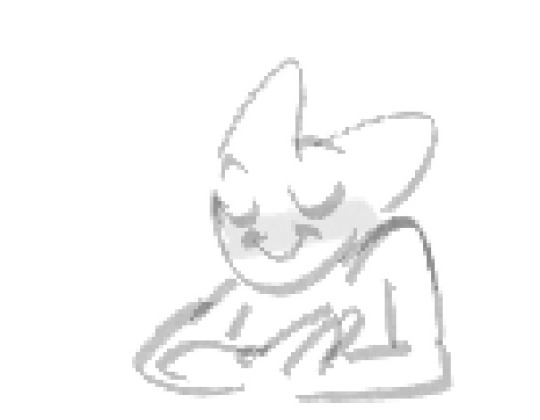
#call me weird for placing cheap ugly shows above Earthspark and Animated#but the thing is#I have when the whole narrative revolves around human kids#*hate#I’m allergic to them#Prime wars trilogy had one of the worst face rigs I ever saw#but it also had Overlord teaming up with evil Rodimus and Megatron being funniest mf alive#Armada is straight up infuriating imma be honest#Armada is like#Au where all the weapons work only once and then just create some glitter#I actually have SO many thoughts on Armada. like. as a writer#the way they keep reusing the same plot 3000 times is borderline impressive#OH War for Cybertron from Netflix was such an experience!#It was so painfully boring and stupid sometimes#but the other times. ooooouuufff. The scene where some nameless decepticon gives Megatron a little tour to show him how him and his friends#-work so hard for the cause??? THAT SHIT HIT HARD#….also I pretty much only like the Quintesson apocalypse arc from the entire Cyberverse#Transformers Victory is fun until you actually hear them speaking#the concept of Star Saber adopting a human child and raising him and then#going to human school as his legal guardian being like ‘yeah sure I can sign all your tiny ass documents’#it’s hilarious but unfortunately all the writers of that anime were snorting cocaine because WHY all the characters talk like that#Animated was fun for me only near the end. Idk what to say. I’m not a fan of any drama centered around humans#things got interesting when Cybertronian government got involved#Earthspark is WHOLE giant topic ahahah. I liked Twitch. sometimes. I also liked Grimlock while he had voice lines. Prowl was fun.#everything else needs and essay haha I don’t wanna annoy anyone#OH I also watching Tf Cybertron right now and this shit is UGLY. they have NO RIGS. THEY HAVE ONE EXPRESSION EACH#but for some fucked up reason I love it. they got the guy named Landmine who only can have (-_-) face.#their Megatron actually respects Starscream so far and regularly gives him positive reinforcement??? I heard words ‘excellent job Starscrea#and went WAIT WHAT#Anyway. If you ask me to ramble about media you get a word tsunami. I have a lot to share
306 notes
·
View notes
Text
hmm

#first + foremost; you are under no obligation to write queer content if you don't want to! you as a writer should be your primary audience.#and that in an of itself is not an issue at all.#but the 'i respect gay people but i don't support them' narrative from a christian woman is. interesting. to say the least.#i can't force somebody to change their beliefs even if i think queer people deserve more than just the human bare minimum of basic respect#but as readers i don't think we should be feeding into and/or normalising this (and on tumblr too lmao 'queerest place on the internet' lol#just because someone posts banger content (because she does have good writing!) i still think it's important to engage w it ethically.#just my 2 cents. i see a lot of mutuals repost her work in the yandere niche and i'm hoping people just didn't know.#don't support people who won't support you! :)#this means no harm to her#just letting people know in case their morals and stance on this allign with mine on this particular topic#i won't namedrop - but dokja might.
318 notes
·
View notes
Text
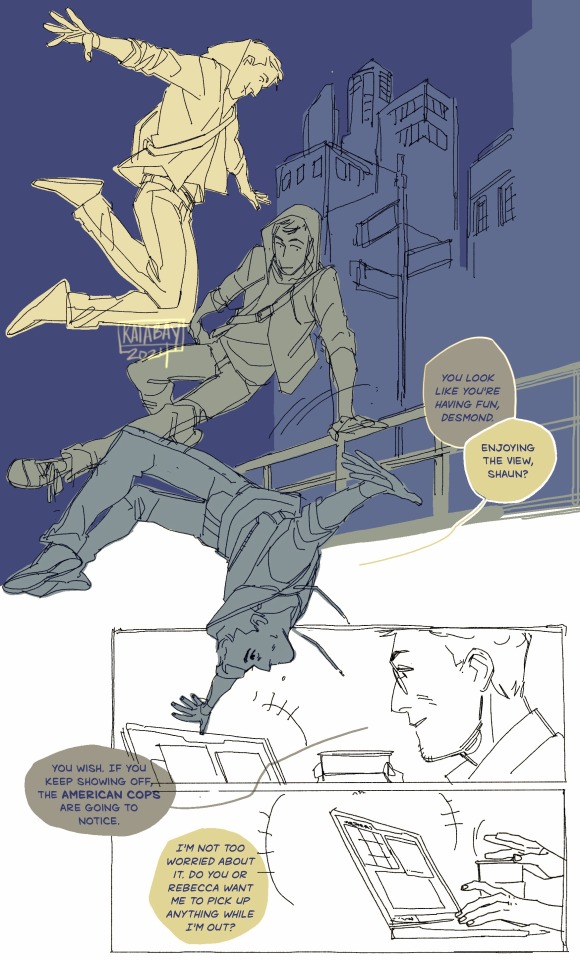
desmond & friends modern day assassin sequences…..I miss you……..
#specifying ‘and friends’ because I hate William Miles with my whole heart and he is not included in this sentiment#anyway vaguely this is nyc so the cops are probably wasting taxpayer money by fucking around in the subway#komiks tag#assassins creed#shaun hastings#desmond miles#this is almostttttttttttt shaundes#but I didn’t continue the dialogue far enough to make it really flirty. There’s a hint of flirting happening.#someday I’ll have to actually do a longer form fan comic to land my favorite ship AND my favorite narrative elements in the same#go (the horror and dialogues on free will and what we owe each other past/present/future & also what failure means AND-)#this ties into my second favorite relationship dynamic: clay and desmond. obvious. clay might live in my head rent free a little more than#Desmond does because that end of game reveal in AC1 is a top 10 games experience to me and I think about it all the time#ANYWAY IM OFF TOPIC NOW. desmond picks up snacks at a bodega on his way back
1K notes
·
View notes
Text
how Nico functions narratively as a character is always extremely funny to me because he has like, exactly 3 modes: exposition, damsel, and dues ex machina.
Exposition Mode is usually whenever Annabeth (#1 designated exposition character. #2 is Grover or insert mythological figure of the hour here. #3 is Nico) or someone else isn't around to exposition for the present cast. He has an excuse to somehow randomly know everything and everyone, no matter what, especially if it's relevant to the plot. He'll randomly develop new skills or personal arcs purely as an excuse to put him in situations where he can exposition, such as him being able to gain insight into the future/prophecies via ghosts (which is a thing in Greek mythology, but still). This is actually why it's extremely difficult for him to function as a POV character in a stand-alone story or first book of a series, because the way Riordanverse functions, the POV almost always only has as much information as the audience going into things and a secondary character explains information to them as they go along, unless it's later on into a series and it makes sense for the characters and/or audience to know that already. That's why Nico doesn't function well as a POV for TSATS but Will would work fine, because Nico's designated narrative role is Knowing Everything/Everyone, Somehow (particularly relating to the Underworld).
Damsel: he just gets kidnapped a ridiculous amount of times. Also that plus his penchant for passing out means there is ample opportunity for scenarios where Nico, despite being extremely powerful, needs to be rescued. Pairing this with how he's always off doing absolutely anything, absolutely anywhere, and somehow knows everybody, he's a perfect means to push the plot forward with an easy "oh no we need to rescue/protect Nico for the millionth time" side-quest or addition to stakes at hand. Or, similarly, if you need to take Nico out of the equation for a bit because he's too powerful and would fix it immediately: oops he passed out/needs to be protected/is kidnapped/etc.
And then as mentioned before - Deus ex machina, kinda literally. Nico is extremely overpowered for a reason; Because he's the catch-all solution to every problem. Just throw Nico at it. We can BS a new epic power for him that vaguely makes sense and yeah he's just that powerful and will pass out because of it probably. Yeah sure he can rip people's souls out and instakill things. Yeah he can teleport anything anywhere under essentially any circumstances. He'll just be a little sleepy. A lil eepy. He needs to take a lil nap. It's fine.
Basically. Solution to literally every situation in the Riordanverse: Throw Nico at it. Just throw Nico at it. It'll make sense. It'll work. Unless he's the primary POV in a stand-alone novel, short story, or first book in a series. Then it won't make any sense because you suddenly have to backtrack like 2/3 of Nico's entire narrative functions and suddenly he is Only A Damsel.
#pjo#riordanverse#nico di angelo#analysis#draft clear-out#i know i've posted stuff on this topic before but i cant find the post and i think it was tangentially added on to a different rant#but while i'm clearing things out i might as well post this#i always find it a fun topic and break of Nico's functions within the narrative#long post //#< long-ish
443 notes
·
View notes
Text
Marcille and Chilchuck’s interwoven character arcs: the fantasy of prince charming, idealization vs pessimism and loss
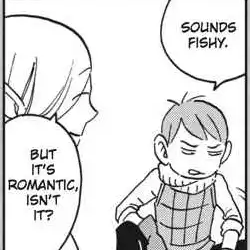
I’ve alluded to Marcille and Chilchuck being central to each other’s arcs so many times but the proper full analysis has been long overdue. I’ve made a post going into their differences and similarities and the many ways they’re foils for each other, but this is going to give more focus to a narrative rather than character angle this time around. We talk a lot about the importance of Marcille in Chilchuck’s arc, it's more obvious overall, but less so about Chilchuck’s importance in her own, so this is going to emphase on the latter. When talking about fantasy vs reality, usually optimism is associated with fantasy and pessimism with reality, but that's not the full picture either. Both situations and relationships can be layered and subtext can imply quite a lot, the reality of things can be more complex than we'd like or hard to reconcile, and that's exactly what we're talking about today and how that is a lesson both Marcille and Chilchuck needed to learn. Give this a shot and look at the manga pages alongside my reading and decide for yourself whether I’ve got a point or I’m going overboard~!
So, Marcille and Chilchuck are character foils in many many ways, and I think a particularly brilliant part of their arc is how they balanced each other out on idealization. On one hand, idealizing things means only seeing what you want to see through rose-colored glasses, on the other, being completely opposed to it usually means denouncing any optimism at all, refusing to hold any good faith or hope. These stances reflect both their backgrounds, as Chilchuck has lived through being discriminated against and taken advantage of consistently, betrayed by employers and eventually the person supposed to be closest to him, his wife, meanwhile Marcille grew up more sheltered and lonely, and books were a big way through which she experienced social situations & the ways of the world in her rural home before going to the magic academy as a researcher and getting more actual life experience herself.
I think it’s especially interesting to analyze the trope of— the idealization of— the perfect chivalrous prince on a white horse who is pure hearted and will make you swoon, in the context of their relationship and their arcs! It’s a recurring motif- you’ll just have to trust me and read further~ Obviously this contains spoilers for the whole manga, so beware! It's very long because I'm trying to cover the topic fully from the ground up, my apologies.
Table of contents:
How they start out
The Daltian Clan and its importance
Prince Charming vs Chilchuck Tims
Ideals vs desires vs wants
Deconstructing realistic romance & compromising between romanticism and reality
Princess imagery in Marcille
Conclusion
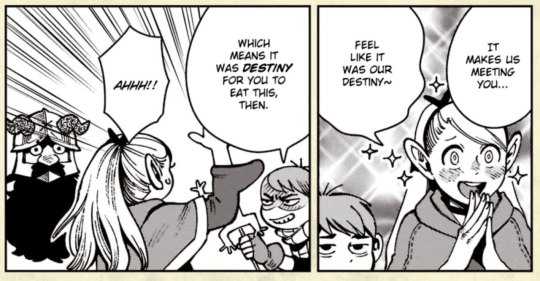
Let’s start with the beginning:
How the characters start off:
Their relationship is both familiar and strained (extra reading: analysis of their relationship pre-canon and early canon), they bounce off each other with the ease of coworkers who’ve been working together for two years and who share similar common sense. Because yes they’re both generally grounded and rational, and generally they respect each other’s input and perspective, but, they both have blind spots…
The biggest hurdle is the way Chilchuck refuses to open up. Marcille has made efforts to befriend him, and though he was open to developing a better workplace dynamic and, say, helping her out with shopping for a pouch outside of work, even if it ended up being counterproductive he’d refuse to even just say his age, let alone share anything about his family situation. Knowing he had kids and a wife would have pretty efficiently fully shut down that he was a kid, and yet he valued being closed off more. Chilchuck is often shown being pessimistic, assuming the worst intentions out of people and being wary of anything good happening, being the last person to trust something or someone, etc. (Quick summary analysis of him I made if you want here, beyond the character foil analysis I linked at the beginning.) He prefers assuming that opening up will only bring him problems to assuming that it'd bring about positive things.
Meanwhile Marcille is very… Honestly she’s hard to classify strongly. Because I could say she’s very open to people, but honestly it’s conditional? She emotes intensely but she’s not quite a befriending machine either, especially when we recall the magic academy days as well, she’s not unused to keeping people at some level of distance, herself keeping a lot of secrets too. She was very wary of Laios at first because she had misconceptions, she holds grudges and isn’t personable with everyone like Namari or Toshiro, when she’s introduced to the party she seems serious and doesn’t smile. While I don’t fully agree, there’s a good analysis not by me here showcasing what I’m talking about. Marcille’s more serious academic side often gets undermined and I think it’s an important part of her, but then the difference between her and Chilchuck comes down to theory vs practice: knowledge vs experience. I think something more fitting to say would be that she’s idealistic and easily swayed, for example the way she lights up whenever she can put a story-like twist on things, her mood can go from dread to hype and reverse in one second, like with riding a kelpie or with the conflict between Chilchuck and his wife, or again with Namari, where it becomes a sort of hero vs antagonist dynamic for her where justice and righteous thoughts should override everything else like needing money to live. She's very stubborn, like he is, but it's easier for her to come around in dramatic ways, on things big and small, mentioning for another example thinking better of orcs suddenly because they can cook well.
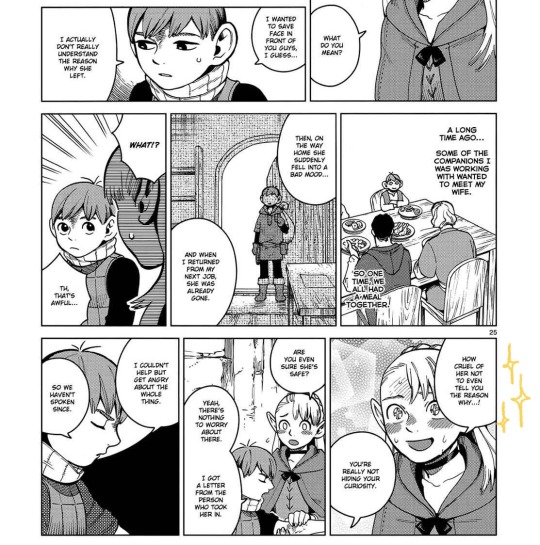
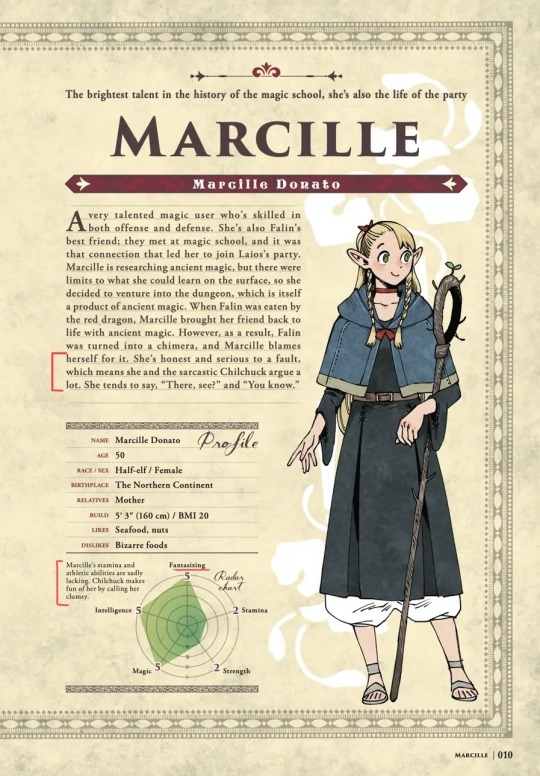
So sure on first meeting she isn’t exactly eager, but then we do see her enthusiastically trying to befriend everyone! Becoming very friendly once she’s done assessing them. She is social, and fittingly she’s very curious about people. And that said, aesthetics do matter a lot to her, and I mean this beyond just enjoying vibes, for example- and follow along the lingo I'm setting up here- if something ‘breaks’ an aesthetic like Chilchuck or Falin not being a child she’ll willfully dismiss and ignore it, if she can spin something into a story like Chilchuck’s breakup she’ll get carried away, she can get the wrong impression, be gullible for the sake of believing a narrative, such and such. I’d say she’s guarded around people at first, but then with time becomes an open book emotions wise, how she’s always loudly and unapologetically talking about her feelings and emoting. She’s not reckless, rather she’s bold and often has to make decisions quickly, like when the plan unexpectedly changed during the red dragon fight, but things like using dark magic can feel like thoughtless decisions looking from the outside, like to Chilchuck, who as per his pessimism dictates he sees all of this in a negative light, assumes the worst: that she’s just ignorant, naive and reckless. She’s easily worried and discouraged but still always perseveres.
He's biased against mages and elves because of past experiences and he projects that onto Marcille. And it makes sense because good faith is dangerous to Chilchuck- for his feelings in relationships yes, but more concretely and important for his life at work, the way an old party of his was going to sacrifice him to succubi for easy money. Like the way he constantly puts his non-work values down to the group so they don’t have high expectations of him, having high expectations for someone else is vulnerability he doesn’t want to or cannot afford. The result however is that he, too, put people into boxes to avoid having his preconceived notions challenged. He's very judgemental, which we see with Laios as well, and even with Izutsumi in the ice golem chapter, but by then he's learned to self-reflect more and be honest with his feelings due to Leed, meaning his social conflicts get resolved more often and more quickly, again like with Izutsumi in the ice golem chapter.
So in the end, there are things that stand in the way of them having true, equal respect for one another. She sees him as a kid despite everything else (being capable and mature, etc etc), and he sees her as a ticking bomb of a naive elf mage who’s gonna get herself into legal trouble if she doesn’t get them killed first.

And it takes an arc spanning the whole manga for them to get there, to truly see each other on equal footing, culminating with the bicorn chapter.
I'm going to be mentioning them a lot so in my mind, the most important Marcille & Chilchuck arc defining scenes happen in: mandrake chapter, mimic chapter, shapeshifter chapter, hypogriff soup chapter, changelings, bicorn, succubus, and Marcille dungeon lord. We're talking mostly about Marcille's discrimination and their narrative about loss here, but on the end of Chilchuck's discrimination the dark magic plot is very central so honorable mention to the red dragon chapters, the harpies chapter and the cockatrice chapter, the latter where Chilchuck airs out his beef particularly directly.
Interestingly enough, the mandrake chapter which is in VERY early manga, where characters and dynamics are still being set up, Marcille gets Chilchuck to say that she isn't a burden and that he's glad they have her and her skillset with them, so the question of "does he respect her at all" was answered before the audience could even think to ask it, and Marcille also makes statements shortly after showing she respects him in turn- more on that later. This has for a result that we do know there's a foundation of respect here, even when as said it's not complete... yet.
So let’s get into it! Early on we already get a lot instances hinting at their opposed core values of optimism vs pessimism. It’s perfectly summarized in the two panel excerpts opening this post: "Sounds romantic!" "Sounds fishy.", hope vs wariness. "Meeting you was fate!" "… Which means it’s fate for you to eat these monsters, too!", if good things happening to you is fate then you must accept that all the bad things that happen to you are fate as well. It’s "Things will work out!" vs "Things will not work out".
The issue here seems rather evident, it’s a balancing game. Compromising, adapting your judgement to the situation. Yes Marcille romanticizes things too much and it can cause her trouble, and yes Chilchuck being so closed off on himself gets him into trouble as well.
(Not telling there was a mimic nearby being maybe the most straightforward example.)
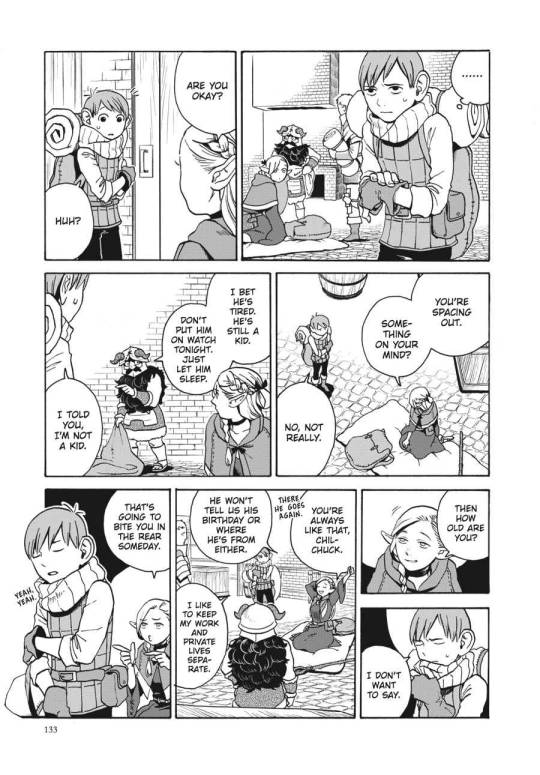
His refusal to hope for anything good happening to him ever is at the core of him not having even tried reconciling with his wife (more on that later with the bicorn chapter). Through the manga, Chilchuck influences her to be more savvy and to respect boundaries more (with himself and Namari for example), while she influences him to become more open and give things a go. It’s no coincidence that it’s Marcille that pushes him to try reconciling with his wife and gives him hope that it just might work out- that that chance even on its own means it's worth giving it a shot.
The Daltian Clan & its importance
The importance of fiction in some people's lives and their specific psychological relationship to it is a very complex human brain topic with many many studies and an infinite amount of subtleties, I can't possibly do justice to this section at its full potential but I'll go over my major points. But the complex and layered nature of this relationship is why, for example, the interpretation that Marcille is a lesbian despite her likely attraction/love for male fictional characters (if not even just simping or stanning separate from those), has legs to stand on and is a compelling angle!
The Daltian Clan, often shortened as Dalclan, is Marcille's favorite book series and is very very personally important to her. In an extra we learn that part of it is that seeing a half-elf character personally reached out to her and meant a lot. She feels seen through it. Even if it's notable that the half-elf haracter isn't her favorite, general Hagreus, but the one with black hair. It's a Cinderella type of romance & convoluted political intrigue series full with a lot of drama, reminiscent of stuff like Romeo & Juliette or Richard III.

I believe that books were developmentally very important for her, similarly as to how cartoons are important to the education and development of toddlers and kids nowadays, or how oral stories like fairytales have always been important to teach lessons. Fiction engages readers and provides emotional stimulation, which can often be a flawed substitute for actual human contact- but nonetheless a big factor in socialization. For Marcille who lived in a rather rural region surrounded by books and chickens, who couldn't fit in with kids of any age around, books were a major part of teaching her how to socialize, how people and social groups worked. This is also part of why the autistic Marcille angle can be very compelling and plausible, though personally I don't see it that way.

So yes I think that sort of upbringing shaped her a lot, and I think it's part of why Marcille has trouble not putting people into boxes... Why even though Falin assured her it wasn't like that, Marcille had made this whole narrative in her mind painting Laios as a villain that stole Falin away against her will/for nefarious purposes. Why she has trouble not thinking of/treating Falin as a kid, unwilling to process how she has grown up. Why Chilchuck has to be very young in her mind, and it was very very hard for her to reconcile the fact that he wasn't. (It's actually interesting to note that Marcille treats Falin and Chilchuck similarly in a lot of ways, overstepping boundaries, being dimissive and touchy- There's a lot to say about how the party dynamic changed a lot with during canon it becoming just Laios, Marcille and Chilchuck at first and Laios' monster interest reveal, notably that in Falin's absence that she may have latched onto Chilchuck and treats him similarly to Falin may be her finding it omforting to fall into habits or filling a hole.) I think complexity in fictional characters gets her gears turning, but there's always a film of impersonality to it right, where it's not real, there's a safe distance, if you want to form romantic narratives about how things went down and a character's angst, you can, but someone who’s real… Things are often uglier or harder to grapple with. And she doesn’t want Falin to have grown up, for her to so quickly have aged. I think applying this sort of storybook veneer onto her real life connections, pushing people into boxes, is a way for her to make social relationships more digestible. And she's a big gossip enjoyer too! Engaging in shallow retellings of people's interpersonal drama, eating it up with enthusiasm and curiosity. Part of it, like with novels, is vicariously living through others I think, experiencing making connections where she hasn't or couldn't, the way her relationship with the other girls at the academy besides Falin stayed distant and shallow despite being friendly. Gossip, like stories, are safe, distant from your own life, they're easy to judge, not unlike the irl popular interest in following others’ online drama. You’re not involved yourself, so you don’t have as much chance of getting hurt. So yes, easier to digest. Less complex, less unpleasant things and less contradictions that are hard to process. Sort of like a defense mechanism to not have your worldview challenged, dodging having to recognize these things by assigning them tropes. And I think part of it too like I implied is: she can’t experience actual loss through books and gossip. They give her emotional social stimulation she doesn’t fully allow herself to have with actual humans for fear of getting invested in a way that’s very raw and personal. Again, like how she pushes Falin away to ignore the more nuanced facets to their relationship! The intensity of what I’m speculating on here in her character is debatable but I do think it’s present at least in some amount.
In a similar way to dogs being important to Laios’ social life (I made something of an analysis on that if you're interested, but this one's not relevant to what I'm talking about in this post) books are her comfort zone. If she can compare a real situation to a story it brightens everything and, well, it does make her assume things wrongly often but it also makes her able to analyze people deeply, like the roleplay-theory-speculation about Chilchuck's wife and the way she hit bullseye on how Chilchuck felt in the aftermath. But like how Marcille only agreed to wear the frog suit when the party told her it'd look cute on her, or how thinking about riding on kelpies made her excited for what previously she saw as a tedious and dreadful journey. Special interest power blast.

And this is where comes in her coworker, a disillusioned embittered man.
A guy who knows all about how messed up the world & people can be and isn't afraid to say it how it is, who in every sphere of life has field experience rather than fictional one- with romance, work, and having dreams & ambitions. Someone flawed and real, someone who won't let her interpret him however she wants without confronting her about it & challenging her to change her perspective.
It took a looot for Marcille to fully stop seeing him as a kid, and in a way I think it was necessary for the dissonance to be both this hard to reconcile and this impossible to ignore: that he truly is a middle-aged man down to his demeanor and family background but that he looks like a teen at most to her. That she literally has to look beyond aesthetics to be able to first fathom then accept and internalize that he's an adult despite his looks. That it was so ingrained and took so long, so much that even while she recognized and said "He's usually the most mature one of us", so much that even as it's implied that she knew logically he's an adult before the changelings, as pictured earlier she still couldn't conceive it. It's like with her calling Laios and Falin's parents kids in a post-canon extra, it's not that she doesn't know it's that it's hard to wrap her head around. Necessary and important because, if Chilchuck was any less loud about being a man she could have gone on unchallenged in her assumptions. If it was an easier to dismantle misconception, something easier to digest, then her arc of coming to see him as he is would have had less impact on her character, afterwards she could continue to run with her own interpretations of people like Falin and Namari without her confidence in being able to pin down people into simple roles being so fundamentally shaken. And it's notable too, that Namari's choice to leave the party to look out for herself situation was decidedly unheroic, but it was Chilchuck who spoke to Marcille about why her decision was both reasonable and had a lot of thought behind it, making her accept that it doesn't make Namari a bad person or even a bad coworker or friend.
Chilchuck is someone who knows that sometimes, bad things happen for no reason, and it's not meaningful or part of a grand narrative, it just sucks and you have to deal with it.
As the foil to her very emotional black and white interpretations of things, Chilchuck represents nuance, and he's impossible for her to ignore.
Prince Charming vs Chilchuck Tims
Chilchuck is so obviously not a prince charming. He doesn't have the looks, the attitude nor the lifestyle. Does he have the virtues for it? Well, no... But also, yes. More on that in a bit. It's also interesting to think of the status aspect to it, because being from an impoverished oppressed class/community is so central to Chilchuck's character, something usually far removed from prince charmings and white knights, and not only status wise but on the topic of virtues... It’s an interesting thread to explore, the way one may have the means to remain chivalrous rather than becoming distrustful and embittered: sometimes optimism is a sign of privilege, being able to be or remain optimistic through life. I'm sure Marcille would be the first to jump onto the aesthetic and narrative allure of a pauper in love with a princess, of a hero of the people à la Robin Hood, but it's still interesting to think of that as another facet of the contrast Chilchuck makes. Alright, tangent done.
But obviously, despite this all they have a great work dynamic and respect for each other's capabilities. It's not like Marcille is mean to people who don't fit these fairytale high standards, no that’s only when she feels wronged or if there's injustice, rather she becomes dismissive of people’s complexity, wether they become an angel like Falin or Marcille’s shapeshifter of Chilchuck or a villain like Namari and Toshiro or Laios when they met. But my point, my point: she actually thinks very highly of him!
"He’s usually the most mature one of us" "He’s dependable, we’re counting on him" "No, chilchuck is definitely virtuous."

And I think the ways in which that shows are very interesting.

^ Ok so this happens, in the Namari chapter I keep talking about. Look at his expression in this last panel. He's always teasing her, but doesn't this here feels a bit... Suggestive? Like he's implying things, not just talking about it in a work setting but also giving her general life advice. Maybe even making an innuendo for womanizers, gentlemen who flirt without meaning a thing and have some hidden agenda. Warning her about smooth talkers that seem too good to be true. It’s honestly a very easy to overlook but defining interaction for them. It’s a quote that’s on his Adventurer’s Bible plus his anime quote keychain merch!
I love his implication that "I say what I’m about straight up, money, so you can trust me"- and isn’t that just the exact thing… Because that is what this is, he’s pitting himself against these people who help without asking for anything and he's saying he’s more trustworthy and reliable than them, driving a wedge between him and those people to prop himself up by comparison. His words tie a lot here into his general worldview too, of course here he's ✨Imparting His Wisdom✨, but it also ties into his self-image issues I'd say, where he’s hard on himself and calls himself a coward etc: if no one has positive expectations for you on an interpersonal level, then you can’t disappoint them. It only goes up from here if you start at rock bottom, can't have unpleasant surprises.
But the meaningfulness of this moment doesn't start and end there: That moment happened in chapter 20, but then this happens in chapters 36-37...
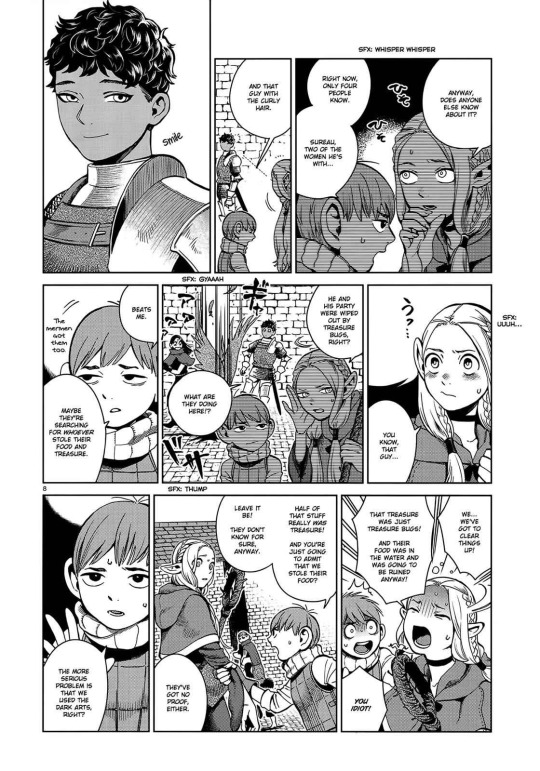
I was always puzzled by the split second interaction between Marcille and Kabru. Marcille blushing is the point, it’s in the anime too and it’s the focus of the panel. That moment of hesitation before she goes back into business mode where she looks at him back, and blushes. And idk I always felt like it was weird timing, like it was a weird beat Kui chose to put emphasis on, why the story even had them make eye contact in the first place, what point it could be making besides "Kabru is handsome and charismatic" which was already made with Hien and Benichidori below, otherwise it's not even like Marcille and Kabru ever interact. Like, maybe it's for it to be a callback when she glances at him while the canaries interrogate her at Thistle's house? Regardless, she blushes, but her expression is more akin to a "Uuhh he smiled at me why’d he smile at me like that. Oh he’s kinda pretty. Well anyways-" rather than swooning or truly checking him out. She’s frowning, even. And like I said, being very naturally charming was a point already made previously.
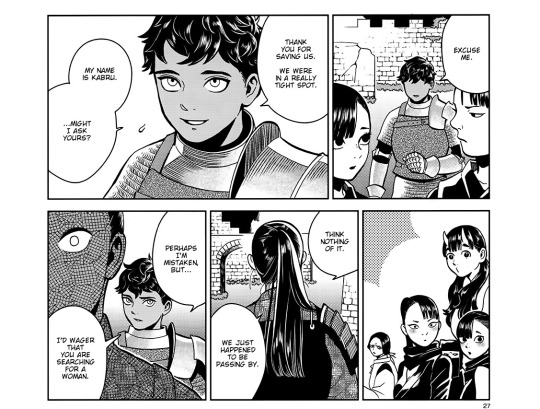
But then… This repeated reminder that Kabru is a lady killer IS the point, Marcille reacting to him in that way IS the point. Kabru is the epitome of ‘will say they help you but has hidden motives and might betray your trust if it serves their interest’ (not a diss on him tbf he has understandable goals), he is the epitome of looking noble, welcoming and chivalrous but actually being dishonest and manipulative, and what’s important here is… Marcille turns away and sticks by Chilchuck. Of course this is logical, no one would expect her to go running to Kabru lol, but I implore you to think of the thematics of it all, a princely guy, the closest character of the cast in the flesh embodying the prince charming persona, is giving her some positive attention, and it does affect her a bit but nonetheless she turns away, and strategizes with Chilchuck instead of trusting or giving good faith or getting carried away. She chooses Chilchuck. Unlike so often, she doesn’t let aesthetics sway her here, get in the way of her better judgement, distract her from the point. She chooses not to give good faith, even if he seems charming and friendly and smiles. Marcille is serious when the situation requires it that's now new, but this is in line with the lesson he instilled earlier above. And if nothing else, Marcille has a good memory, exhibit B to come later. Here we see part of why Chilchuck was afraid of Laios or Senshi but not Marcille blurting out the wrong things with Toshiro and is party, when push comes to shove they're often on the same wavelength. Marcille and Chikchuck do strategize with specifically each other regularly, they do tend to pair up a lot after all, so this isn’t especially new, but it’s the first time there’s this sense of us vs them imo. Like how earlier Chilchuck was saying that he’s better than the smooth talker type, here we see Marcille implicitly agree.
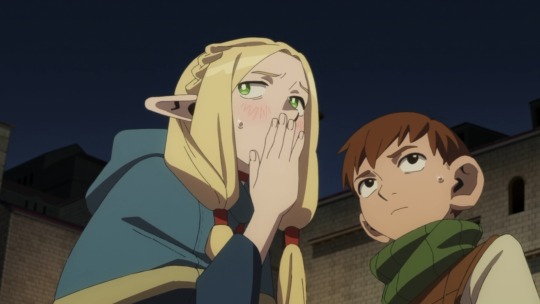
She just has a passing glance & thought for Kabru but she knows her true allies and true values, and she wants to strategize with Chilchuck. What I am saying is that if she was given the choice to think through going with a guy that seems perfect and chivalrous like her succubus, if she was logical about it she’d pick Chilchuck over that guy actually, yeah. At the end of the day, no matter the pretty smiles, she knows who her actual friends are. Whiiich on that topic, next section!
Ideals vs desires vs wants
It's succubus analysis time

Her succubus is quite direcly a prince figure, a knight on a white horse who's come to whisk her away. He calls her princess, even! She's taken the role of Daltian Clan's protagonist, essentially. He kisses her hand, nothing short of the most classic courtly romance tropes. He's even drawn in a noticeably more shoujo style, not unlike the characters' faces in the aftermath of getting their energy sucked by succubi.
I made a whole analysis on specifically Laios’ succubus but it covers some stuff that could be interesting for this analysis as well, I’ll repeat the essential stuff tho: Their succubus all show what type of social connection they desire. Izutsumi’s is familial, Marcille wants someone she can emotionally connect with, seemingly romantic, Chilchuck wants something physical and sexual so he doesn’t have to think and worry about anything deeper (betrayal, insecurities, etc, the difficulting that come with a committed romantic relationship- also likely related to his senses & stress), and Laios wants people and friends who’ll accept him and his monster interest- platonic.
But more interesting for this analysis is how succubi work. The goal isn’t to beckon, but to incapacitate. The succubus doesn't work on the basis of rationality, it’s not a factor they go for and it’s not one they need to appeal to either, as we see. (Laios is a special case -gestures to the linked analysis- but the succubus doesn’t appeal to his rationality as much as it soothes his worries, his friends judging him etc etc, and the reason Izutsumi could remain unaffected is that there is always a half of her not enthralled by the succubus because she essentially has two souls.) Neither Marcille, Chilchuck or Izutsumi could realistically expect any of the people they saw to be real and not fake succubis. They KNOW that, they were actively preparing for the succubi to jump on them and fight back, rationally they know they're monsters! But how this monster works is that it targets deep desires within you that when face to face with it'll make you hesitate, make something in you unable to fight or flight and instead do the third instinctive option: freeze. Or especially in Laios’ case, the form gives the victim just enough confliction on the matter for them to want to believe it’s real. All they have to do is just not move, stay passive and accept the attention, so it’s not an issue of wether they reciprocate an action or run away. It's so that it shortcircuits you and leaves you open to pick like a fruit.
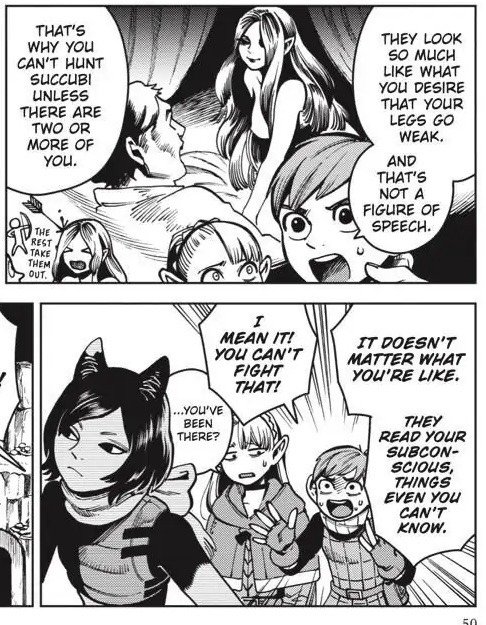
If this wasn’t the "reads your heart so deeply that it freezes you to the spot" monster, Chilchuck WOULDN’T be doing anything with these women. He’s been devoted to his wife even 4 years after separation on bad terms, you think he’d ever cheat on her? If this was a decision he were to make, instead of just freezing, he would reject it. In that similar way, Marcille’s succubus might not be what she’d rationally go for. You think if this was what Marcille had to choose, the person she wants most to see and at her side, her most alluring form wouldn't be Falin, alive and well? You think that wouldn't be the thing Laios truly wants most as well? And before people say that canon proved that the latter wasn't with the curse the winged lion put on him, THAT'S THE POINT!!!! You can irrationally desire things, you can desire things to degrees so deep you can’t change it even if you wish you could, but if it was truly a choice up to you, you'd choose otherwise. Laios decided to become king, even if that's a lifestyle so far from what he truly wanted, even if it is duty more than fun for him. Like how Chilchuck would choose faithfulness despite for sure having come into contact with many beauties through his four years of separation.
Ideals vs reality are a big Dunmeshi theme in general, same as wants vs needs, and you can see Marcille’s daydreams and novel themes make it an especially relevant throughline and theme for her. Not unlike how in my opinion General Hareus and Mithrun intentionally look very alike to contrast reality vs fantasy!
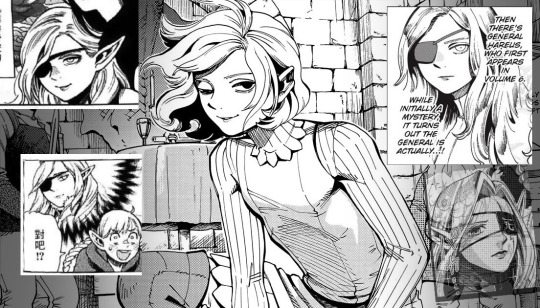
Marcille never reacts any particular way to Mithrun’s appearance despite the blatant resemblance, so that makes me think the point/joke is meta rather than character focused. The romanticization of elves and their societal drama in their fiction contrasting heavily with a very real and imperfect product of their military system. The canaries certainly aren’t glamorous next to whatever military Hareus is the general of. There’s even the fun little details like Hagreus’ lips being drawn with extra details because they’re full and pretty while Mithrun’s lips are drawn with extra details because they’re chapped and dehydrated. Hence the fantasy vs reality theme, both in that fantasies can be very disappointing when realized and in that they may not be what you actually want past your mind palace. Marcille doesn't even react to him- which we could almost directly parallel to how pretty young blondes is Chilchuck's type but he never seems to make a big deal of Marcille- he still wants his wife.
So yes, themes of what you actually want vs irrational cravings. Base desires vs actual wants. Needs are also separate, but not relevant for this discussion. To get to the specific definitions I’m using for the words in this section’s header, ideals vs wants vs desires: ideals are your ideal of something, the best degree to which a thing could be tailored to you, and it can be derived from both wants and desires, usually a mix of the two, but for example: I’d say the succubus is a type of ideal (the platonic ideal of allure to the victim) derived solely from desires, because a want is active rather than passive, acted upon rather than suffered, because a want unlike a desire involves thinking things through. So a want: something you want, you take actions towards getting or achieving it, it can be a very strong feeling but it’s something you pursue or wish to pursue. Finding a cure to death is a want, not wanting to be alone is a desire, see, I’m assigning desire this more primal or unchanging subconscious nature to it. On the flipside with Chilchuck, sex without ties, easy pleasure, is a desire, but the want is not having to think about his marriage situation because it’s painful, not wanting an emorional connection because it’s all the easier to be hurt with, just wanting to take his mind off of everything for a while.
Thus the succubus targets Marcille’s wish for a perfect knight who could cherish her forevermore, someone safe and known and fantastical, just hers in a way, free to see and construct however she wants because he’s a character to interpret, and it targets Chilchuck’s wish for pleasure that’ll whisk him away from the stress and pressure and reality of his life, something that’ll make him feel both good and desirable and emotionally uncompromised, not unlike what alcohol does, as he says he likes having his fine senses dulled in the changeling chapter. Idealization is twisting the image of something in your mind to be closer to what you want, but usually mostly desire on a more subconscious level, to be true, almost a wish, sometimes but not always hand in hand with idolization which is to put something on a pedestral. Idealizing things that are easier to reconcile with mostly, in Marcille’s case: it’s easier to believe that Chilchuck is very young and it’s easier to stomach that Falin hasn’t aged much, it's easier to believe Falin is an angel who can do no wrong and if she left with Laios it's not that she chose to leave Marcille, and it's easier to believe Chilchuck is just a moody closed off youngster than an embittered old man. It can be done to people as much as concepts, like the idea/plan to give everyone a 1000 years lifespan, surely that'd do really well and everyone would love it. Wants and desires are both very often about changing reality after all, wether it be your situation or an event in your past or a law of the world like death, but wants are mostly through actions and since desires are more subconscious it can lead to self-delusion easily. Like with succubi, wants engage with your rationality so they target desires instead. The demon's strategy isn't too far off, either, feeding into both and using underlying desires to manipulate its victims. Dungeon Meshi is in part yes about resisting desires, the irrational cravings, mostly through the character of the demon. I mentioned needs earlier, and to ideals vs wants we also add vs needs, both emotional and physical, and needs alongside wants are what Dungeon Meshi wishes to promote for a healthier person, Dungeon Meshi which illustrates very well with the dungeon lords that you can be a slave to your desires.
The parallel between succubi and demons is intentional. The demon is in fact the origin of the succubus myth in-world. No wonder they operate similarly in many ways- the succubi are in a way a more simple straightforward version of the demon, with less convoluted strategies and less intricate manipulation.
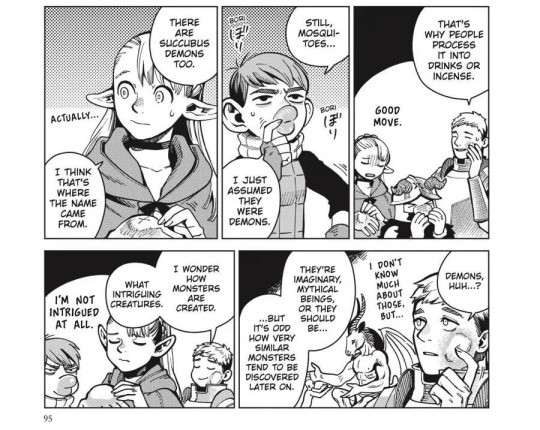
Of course the succubus each character sees does say something about their characters, but what I’m saying is we shouldn’t assign choice or morality to it as if it wasn’t an ethereal monster whose whole biology is focused on being able to freeze people through appealing to desires, much like how we can’t fault people for falling for demons’ manipulations. Like that’s their WHOLE thing and they use mind control through enticement shenanigans. I know people sometimes fault Chil for his succubi and if you want here’s my stance.
Point of this whole thing is, people can rationally choose things that are different from their deeper desires, like in truth Falin’s safety being more important to Laios than becoming a monster. Like how Marcille stayed with Chilchuck to strategize instead of wanting to give good faith to Kabru. Yes, this is the main point I'm coming at with this section lol. Marcille idealizes and idolizes the figure of a perfect prince charming, undoubtedly! But when it comes to what she actually wants, not in some ideal fantay world but in reality, she knows Chilchuck and her imperfect friends are some of the best she could ask for. She's content with them as they are. She would choose a flawed reality over a perfect fantasy.
That's a big part of what her dungeon lord arc is about too, all her tendencies to ignore what others want for what she thinks is best for them or thinks is a perfect course of action: accepting that people are complex with different wants, and that something that's a no-brainer to her like wanting to live for a long long time is a solid no for many. And Laios and the party confront her about it, and Marcille, even under the influence of a demon, chooses to accept reality. Chooses to accept that there are some things that, even were she to be able to, she shouldn’t change after all (even for stuff that’s not forcing everyone to live for a millenium, like bringing Falin back from the dead is something that the party and Marcille had to come to terms with maybe not working and the way they went about it was self-centered). She chooses to come back to herself and the party, to accept the world as it is even if flawed and sometimes hurtful.
And hm, I wonder if Chilchuck had any role in the lead up to that particular decision... I wonder if Chilchuck was a major influence in teaching Marcille that the world isn't perfect and her internalizing things that were outside of her bubble!! I wonder if Chilchuck was directly what made Macille turn towards her party and thus start thinking of giving up on being dungeon lord!! Joking, joking, of course it does. To be continued, see you in the princess imagery section at the end of this essay.
Essentially, this section is to show that: 1) despite what her succubus may suggest, she has indeed grown by that point in the manga compared to pre-canon and her overly idealistic simple black and white vision of things, and it doesn't prove the ‘choosing her friends over a prince thing’ wrong, and 2) despite how deeply ingrained romanticism is in her and how it calls out to her, she still has chosen and continues to choose reality and her friends over it. How fantasy is important to her and how much she loves it, and her having the will not to mindlessly succumb to it coexist and it's that resistance against fantastical ideals that speaks of her as a character so much.
And what does that mean, for Chilchuck? For him and Marcille?
Deconstructing realistic romance AKA compromising between romanticism and reality AKA Chilchuck Tims vs Prince Charming part 2
So what we’ve covered so far is that 1: idealization is something that Marcille does a lot, including concerning Chilchuck, 2: the prince/knight figure is meaningful & important to her, 3: Marcille isn’t a lost cause on it, and for instance, much like how she stops harping on Namari after Chilchuck explains to her how professional reputations and networking work, he can change her mind on things.
Let’s get back to their prejudices of each other for a bit. You might have to zoom in for this one.

Her shapeshifters of both Chil and Laios are influenced a lot by looks and impressions. She’s very adamant about Laios and Falin not looking alike at all, for one. Marcille’s view of Chilchuck’s lockpicks are surprisingly accurate. Meanwhile, despite their first big relationship moment during canon being about how he’s glad to have her and her skills for the dungeon dive, he still ridiculizes her magic somewhat with the crude spellbook. She’s still silly and tease-worthy to him, even while he praises her like in the good medicine chapter with Leed he says it himself in the same breath. Silly, or "ridiculous" depending on the translation, is somewhat ambiguous, but I assign it the meaning of 'thoughtlessly reckless', like how again in the good medicine chapter when he's saying this he's referring to Marcille's future job prospects, because law and career are important to conform to for him. Despite this, their shapeshifters’ behaviors are accurate, although Marcille’s Chilchuck is nicer and less bitterly reclusive. Note how it's Marcille's chilchuck that makes it furthest and how why she thinks hers is the true one is that her Chilchuck "looks less mean"- this is what I mean when I say she idealizes him and sees him as a little angel, along with his fluffier hair it gives us the perspective of why she'd find him so hair-ruffable and why she likes sticking to him so much, I suppose.
Marcille's arc of not seeing Chilchuck for what he is has steps, it's not like Senshi who does an 180 seeing his changeling. There are a couple of important moments for it that tell us her progress and changes her perspective: Him telling his age -> the shapeshifters (our best look into an objective assessment of her perspective) -> reveal that he has a wife and kid(s) (fully shattering her denial) -> seeing him as a changeling (true reckoning. Putting the nail in the coffin of what reality is) -> bicorn chapter (acceptance. Internalization)
You might notice that the explanation for Marcille’s Chilchuck is "Even though she’s been told he’s an adult, deep in her heart she still doesn’t get it", and a fantranslation translates it as "Understands he’s supposed to be an adult, but hasn’t quite come to grips with the fact internally". This definitely implies her arc of growing to see him as an adult had already started by then. Especially if we compare it to Senshi’s more intense babyfied Chilchuck. This goes back to what I was saying about Marcille watering down people for the sake of aesthetics, some rational part of her knows he’s an adult, but it’s emotionally that she struggles to reconcile the fact with her perspective. It’s actually pretty ambiguous when she first starts considering he might be an adult. If by this point she was already digesting it, then I think it must’ve been when he told the party his age. It’s not unsimilar to rationally knowing Falin is an adult at 23 even if it doesn’t feel like it to her, or post-canon calling the Touden parents kids even though obviously she’d know they aren’t actually, it’s classic longlived race patronization. He’s older than Falin, by 6 whole years, and even Marcille isn’t that blind to what that'd mean. Wouldn't marcille also have a problem with child labor otherwise? There's also how Marcille pre-canon shortly speculated Chilchuck was in love with Namari in her Adventurer's Bible extra. She for sure has witnessed a lot of half-foots walking around, probably even drinking at taverns. She knows, on some level. Chilchuck even does a whole rant after they react going on "this is why long lived races are condescending assholes". So that’s my bet, "Is he an adult?" "Well yes but actually no" (Chilchuck), "I’m an adult now I’ve grown" "Awww you’ll always be like a kid to me!" (Falin) Depending on the dub and interpretation, I know for example that when I made my family watch the anime they thought Marcille "See? You're just a kid!" after he said he was 29 they saw it as teasing and playful, unserious, or even disappointed, implying she'd have thought he was older than 29. It's actually ironic how someone as developmentally atypical as Marcille, whose physical and mental growth was unpredictable, unsynchronized and messy, would judge others by appearance and age so much. But well imo appearances are important to her so in that way, she especially judges those because she had to live through being judged by those standards as well. She puts elven standards on everyone the same way she does with beauty standards, so age is included in that.
Marcille here is struggling with dissonance, it's why she "hasn't come to grips with the fact internally". And this all makes sense for the arc that sharing things about himself is what opened the gates of being understood better. Point is, her vision is influenced by her own feelings of how things should be like, veiling herself to the reality of things.
And notice the point that the problem her lack of rationale when it comes people- Chilchuck regularly makes her prioritize rationality over feelings, and well that’s somewhat his whole schtick when it comes to debating philosophy. With Namari and how her leaving the party and not returning is reasonable even if it feels wrong, just like the "don’t trust someone just because they seem well-meaning and generous, strategize instead of swooning", and ironically also the "it's important to take in mind how things like touch when healing can affect parties and create love triangles" lol, "don't be emotional, and also remember people being emotional will stirr up shit". Since she’s someone pretty swayed by feelings, it balances her out. Ultimately, if we consider the Dungeon Lord arc her culmination, it’s Chilchuck who ends her arc by meeting her halfway through appealing out to her feelings, but that’s the flipside of the coin of their arc, and it’s her willpower to face reality that saves them so I don’t think that contradicts that Marcille had to do her half of the journey & comprise.
I would argue there are many hints of Marcille knowing on some level he's an adult throughout early canon. Not just seriously calling him the most mature of the group, but her behavior at the Golden Kingdom's too for example. Would you act all shy asking a kid to sleep in his bed, especially one she's always felt so comfortable trampling the boundaries of and touching casually? Idk that's weird. She's asking to sleep in his bed because by her own admition it'd make her feel more comfortable. Chilchuck is safe to her and she feels shy implying it and asking for a favor like that. Shy that he'd find her silly for it, and/or shy that this might be inappropriate according to etiquette and in other contexts. To me this feels much closer to two peers, like how in the mandrake chapter she wanted validation from him too, and yes she still infantilizes him and emasculates him into someone who's harmless in her mind- not just someone who wouldn't hurt or take advantage of her, because she knows that, because Chilchuck does protect her (more on that later!!).
He's not heroic, but he's brave, when it matters. He's mean and rude, but also caring. He's responsible, even when it means going the unpleasant route. The aesthetic doesn’t fit the role, but the actions do.
He keeps claiming he’s a selfish coward who’ll be the first to dip in a fight, and yet he’s always, consistently pulling her out of danger, or specifically calling out to Marcille when danger strikes. And I think it’s because of the nugget of info we get in the adventurer’s bible that her stamina and athletics are bad, in canon he does call her clumsyhead like once but it never felt enough for me to deduce that on its own personally. So then the reason why he’s always targeting her, beyond the reasoning that she’s the healer thus the most important to keep alive (which he brings up in the rabbits chapter), he takes it upon himself to help her, save her and pull her away from danger because she’s clumsy. She’s not defenseless, she’s known to use explosions, and still he feels the need to save her and through the manga he’s even died trying to pull her to safety one and a half times: dungeon rabbits + the drowning- they didn’t die in the latter though it’d have gone that way if it weren’t for the water bursting out just after, and that situation was especially hopeless regarding Chikchuck being able to do anything to save her at all, yet he still tried.

A little knight in shining armor, a little noble hero, a little prince charming innit?
Chilchuck IS all show and no talk- and she knows the value of that!!! It's why despite all his sour demeanor she respects him both professionally and as a smart guy she can trust, why she feels safe with him and wants him by her side when strategizing or even sleeping. The aesthetic doesn’t fit the role, but the actions do. Fantasy vs reality!!! He teaches her how to face reality both with his words and actions, through the contradictions of him, his caring behavior and bitter words, his old manners and young looks!
And actually let's TALK about that drowning scene hello. There, in the collage above, in the bottom left. The context of that is: This is after the demon leaves when the dungeon collapses, the dungeon gets flooded by water and they go under, with no sense of where or how there could be an exit to this. 1: Since the dungeon is collapsing and reviving someone only works in dungeons, there is no guarantee that Marcille or anyone would be able to revive someone during or after this, NONE. 2: He is risking his life for her, he is STRAIGHT UP playing his life on this choice, action hits and shit gets more serious than it ever has, and he yet does it anyways. Perhaps it's the gravity of it that pushes him to make this choice, that this time if someone dies it's for real and he can't accept that, but either way his choice is made in a split second, he prefers dying trying to save her than living without saving her. He is fighting for scraps of hope, seconds more of holding onto life. Which, 3: This situation is HOPELESS. In the end yes they end up being spat out by some exit out the dungeon with the strenght of the flood, but there was no way to know this would happen, and like we see in the third panel Chilchuck and the others actually lose consciousness. That's for "a way out of this", but even moreso, what is he hoping to accomplish? He's small and weak like he always reminded the party in fights, he CANNOT PULL HER UP TO SAFETY, HE CANNOT PULL HER AT ALL, WE SEE HIM STRUGGLE TO AND FAIL. HE CAN'T DO ANYTHING BUT HE STILL TRIES DESPITE THE RISK. You might also say- haha!! You might also say that this is a show of optimism from him!! You could say that after Marcille changed him, pushed him to have more hope in him, he now has the strenght and will to hope that this might do anything, that this might save her! A little similar to the situation with his wife actually, the point is that the chance is worth taking even if it might not turn out like hoped for- the point is that it's always worth trying and keeping hope to fight on, there is risk in being vulnerable and reaching out to his wife yes, there is risk, as with jobs, as with finances, as with anything- It's not that you'll never fail, but you have to not give up when you do- there's a risk but you can't just shut yourself off to the world and to relationships, you can't suddenly care about nothing! That's Chilchuck's arc! And maybe it's because his arc of becoming more hopeful and open yourself to caring centers her that it's her he latches onto here and not Senshi and Izutsumi who are equally in trouble here, maybe it's because he knew her longest or because he still feels this sense he has to look out for her like always, or because he trusts her to breathe underwater least, I don't know, but it's what happens! And listen, by all intent and purposes it was a hopeless situation, they were on the verge of drowning but he still fights to save her, and everything looks lost for a sec, but then the water current miracurously spits them out of the crumbling dungeon. He gets up and he runs to marcille fearing she's hurt but no, they're saved, she's fine, they're all alive and out of danger. It worked out. Having hope was right.
They make me ill I tell you. Like what the HELL, am I supposed to NOT go crazy when this happens??! What if they were the meaning of life what if their arc was about cracking the balance of living and loving healthily and cracking the code of life. Okay. Okay okay okay so anyways so
He can be quite self-sacrificial and noble! Always looking out for others, and giving Marcille particular attention in that regard, likely in part due to her being clumsy in his eyes and her being the healer aka their token of safety.
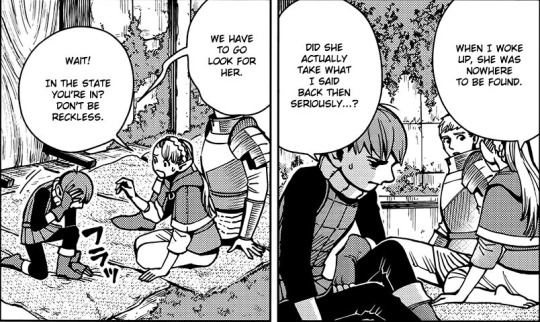
Sit your ass back DOWN you are in no state sir. Despite her biases Marcille is still observant, she still loves dissecting people like in that pre-canon party relationships chart in her extra, she's still the one to say "Chilchuck is the most mature here". Marcille still notices things! She has an interest in people and Chilchuck is someone she especially likes to "study". She read him like a book in the bicorn chapter, and if she was able to it’s that she looked, she remembered, she saw. The way he doesn’t like waiting on people, that he’s very reserved with feelings, the way he often doesn't pick up on others' and even his own- It all comes through in her quote unquote analysis of him, what married life with him would be like and how he reacted to his wife leaving.
Point is, Chilchuck is very harsh on himself, but there are gems inside of him, there is gold hidden away if you dig at his heart. And point is, Marcille is good at highlighting those. And besides, isn’t humility a mark of heroes?
Okay. Sooo there's not that much to say about the changeling scene actually, for both Senshi and Marcille, the chapter just previous where Chilchuck reveals he has a wife and kid is what fully reckons them with how Chilchuck is a fully fledged adult, and for both of them seeing Chilchuck as a tallman is the final nail in the coffin. With Senshi it's a rather fast 180, and he mourns the sweet kid image he had of him where he poked his cheek and ruffled his hair, but for Marcille it's just an extra "he's really really REALLY really not a kid. Really". It has a bit of a reversal of Marcille and Chilchuck's dynamic, since now he can manhandle her instead of her manhandling him. This is a rather pleasant experience for him from what we can tell, whereas Marcille is struggling to keep the party's walking pace and complains about the heat implying half-foots are more sensitive to temperatures, Chilchuck finds having his senses dulled relaxing, has no problem of the sort Marcille is having AND! And! He can pull her around. The fight with gargoyles happen and he's pulling her arms, picking her up, he even throws her both before it and during the fight, he has the physical power to push her away if he wants to and also to pull her out of danger- the way he later tries to in the rabbit chapters and with drowning, but also when the Faligon reveal happens. He still doesn't look like a knight in shining armor, and he still doesn't have the demeanor of one, but he has the most power to protect her than he ever has. Anyways so yes, further "oh Chilchuck is an adult. And he's kinda knightly and can protect me wow. And also ugly not at all like elven beauty ewwwwww. I won't be able to unsee it now if I try to ruffle his hair after this".
It’s always a question of seeing more facets to someone and slowly digesting them and internalizing them, like Kui puts it herself in the shapeshifter explanation for Marcille's Chilchuck. And this illustrates a bit what I was saying in the section about Dalclan and tropes and people being "digestible" to her. She has to get used to the idea first and it's a slow process.
And during the succubus chapter as well, right after the bicorn chapter where she fully accepted Chilchuck as an adult, Marcille doesn’t falter when she’s confronted with seeing Chilchuck as, for a lack of a better term, a sexual being. She even cracks a (albeit sfw) playful quip about it, about them being all blondes. I suppose with the crass jokes he made like during the frog comic that might have prepped her for it lol.
And on that topic... We're here guys. The holy grail of Marcille and Chilchuck.
🔥The bicorn chapter🔥
The chapter finishes both Marcille and Chilchuck's arcs about harmful idealization vs not being a doomer, so to speak. It's the culmination, the ultimate balance found, the moment where the lesson gets fully internalized on both sides at the same time. It is a MASTERCLASS in how to do relationships arcs and character studies.
Chilchuck starts the chapter being dismissive of Marcille and her interests again, it opens with a narrated bit about his bad experiences with romance in past parties and he admits he has contempt for people who find the topic of love fun. He sees her still a bit as both a fly circling around him and a venus fly trap waiting for the opportunity to pounce on him and not let go until he spills everything. He ends it though, willingly giving up information on him in conversation with her, opening up, and appreciating her perspective on his romantic troubles.
Marcille starts the chapter having mostly processed that he's an adult, asking him about his wife, but she's still Weird about him and his personal life- and okay, that doesn't quite change, but something does change- everything changes for a moment, in fact.
And what's the catalyst? The cataclysm, even? Chilchuck lies and says he cheated on his wife.
[Okay guys I am officially out of pic space, sorry but I'll have to start recurringly linking to images instead: page]
We get to see live Marcille's esteem for Chilchuck plummet and freefall to the ground. And Chilchuck often acts like hassling and teasing between them is onesided, that she's always the one harassing him, but since early manga Chilchuck has always liked to tease her every opportunity he gets, often initiating interaction just for it... During half of this chapter Marcille is giving him the cold shoulder and we get to see that he misses her, we get to see her fully shut down the (racist) joke he throws at her and see him be SHAKEN over it. He wasn't expecting his lie to tank his reputation and relationship with the party members this much, maybe because before whenever he called himself selfish and cowardly no one seemed to think less of him for it, and he's at a loss for what to do like we see here. He misses their friendship. He's always said he didn't care for having a friendship with them all and whatnot, but here we see him grapple of the aftermath, of knowing what it would be like without them as friends, without them at all.
[page 1, page 2.]
And like with his wife, he has a choice to make. Be passive and spiteful and do nothing, or be vulnerable and communicate to win them back over. And this time, after a manga's length of learning little by little to be more open (and literal coercive torture) he chooses to do it, to try and clear up the misunderstanding.
And listen, on Marcille's end this was NEEDED. He DROPS in her eyes to deserving no respect- but even in these times we see her be jealous of Chilchuck opening up to Senshi, implicitly still caring about what he thinks of her, and most importantly that she does still care about him himself when the bicorn breaks his arm and she runs to his side to heal him, worried. Why was this needed? Because Marcille was forced to have her full, complete vision of Chilchuck shattered. Not only is Chilchuck not little in her eyes anymore, but he's also no angel. He can MASSIVELY- borderline unforgivably- mess up. He is an adult who can royally fuck up, even be immoral. She calls him a depraved adult man.
It sounds negative, but what this does is actually strip him from any idealization and infantilization in her eyes. Is there something more adult than adultery? Is there something less honorable, less wholesome? In this chapter Marcille is forced to reconcile the Chilchuck she knows with this man who did something vile to his wife, even the mother of his child.
And then Chilchuck clears things up, he takes the risk of an argument and actual rejection and sacrifices the secrecy around his family situation to make up with her. And it works. Instantly.
And so he goes "Okay so one day she left me and I have no idea why, probably for no reason. The end. What a petty thing to do am I right. We'll probably never talk again." and she's like "Bet? Actually I have several ideas as to what could have happened and you WILL listen."
(For a Chil & Chilwife analysis go over here instead btw.)
She was always perceptive, but she always had a bias that made her vision of others flawed. Her lens of novel worlds and narratives. Remove, or at least shift that bias in a productive direction, and you get a strength rather than an hindrance. The skill of self-inserting (literally. The half-foot depicted as his wife is even literally Marcille a a half-foot, and his child looks just like him, to show just how good her imagination is lmaoo) Marcille is such the "If I wanna hit the ball… I must become the ball" type. As proven by how she controlled her familiars in the hypogriff chapter. "If I were your wife I’d be overjoyed to go out with you and would get myself prettied up while you complain about me taking a long time, your friends would tell me that I’m cute and nice and that’d make me happy, but I’d also be sad because you wouldn’t tell me that you love me enough. Then I'd leave to test your love, and you're failing that test rn but if you came back to me even after a long time I'd take you back for sure." And see these! See Chilchuck frowning there in how she thinks of him, how he gets peeved when she takes time to get ready.
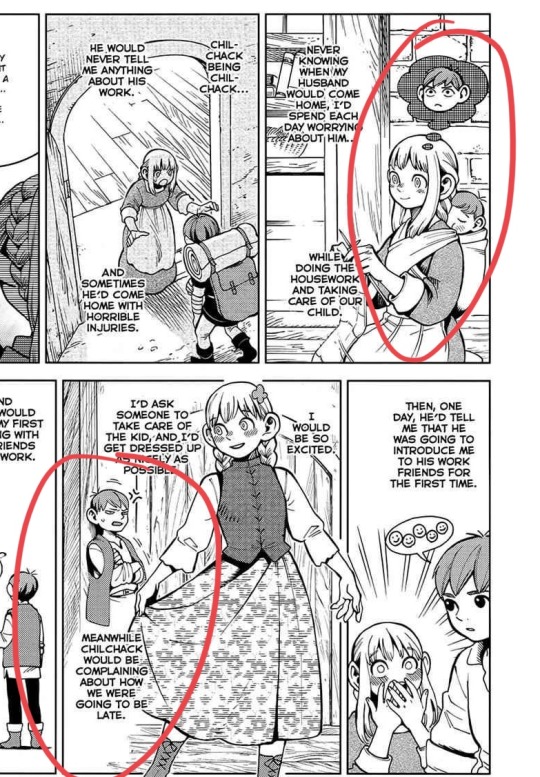
No because, this means everything. Marcille started out the manga thinking he was just a kid with a party pooper attitude and even in the shapeshifter chapter where she’s more coming to terms with her having been wrong about him, her shapeshifter of him is sweet and cute and nicer like "No the REAL Chilchuck is much less nasty! ☺️". But in the bicorn chapter it all comes to a head!! Learning that "Chilchuck cheated on his wife" made her esteem of him tank to rock bottom almost, finally acknowledging that Chilchuck can both make adult mistakes and be significantly flawed. But then! The chapter ends by him opening up which in turn make her esteem of him comes back up, but things have changed, still. What she does with her "virtuous husband" bit might seem like idealization again, and she is being optimistic about the wife'smotives, but she’s not making him into something he’s not! She recognizes his flaws (embraces them even.) Like how as the wife she thinks of an angry/frowning chilchuck, how he complains about waiting on her, which he's also done to Marcille before...
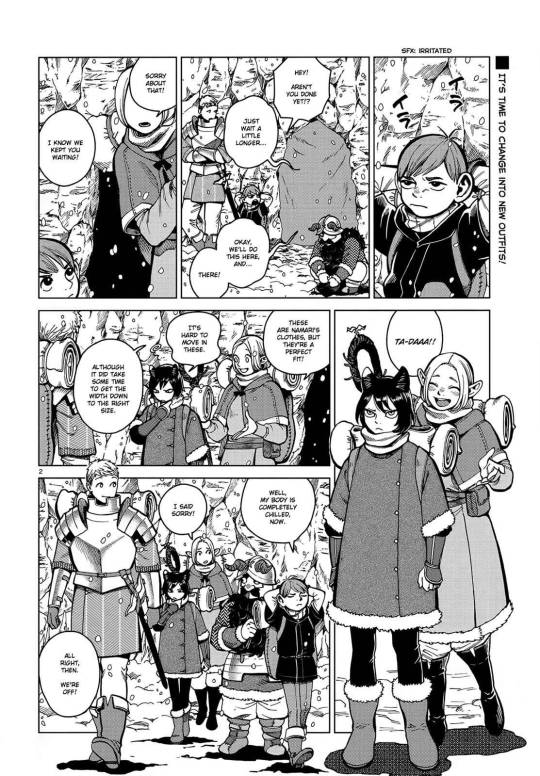
Even the way she says "he wouldn't say that he loves me enough" IS DIRECTLY SOMETHING FROM HER OWN EXPERIENCE FROM THE MANDRAKE CHAPTER. Because then she wanted to hear from his mouth with his words that he does value her, that he does appreciate her, that she's not a burden to them! She knows how it can feel like he doesn't appreciate you even when he does, and how insecure it can make someone! Now when she flavors things, she takes the embellishments from her own experiences instead of from novels! Reality, too, can be romanticized without becoming pure fantasy. Fantasy doesn't have to be dry and bitter, it can be beautiful and fun, too. Her "if I was your wife, life would be something like this and I'd feel like this" is truly based on her own perspective and feelings- her empathy and interest in others is not a weakness like Chilchuck thought, it's borderline a superpower.
She doesn't just keep his flaws in mind, she also hypes up his qualities!! He is virtuous, bicorn approved, devoted even after separation!! And that hyping up, and optimism that things wouldn’t necessarily go bad if he tried to mend things with his wife, really gave him hope, and also finished up his arc about optimism not always being bad, sometimes even being necessary.
She inspires him to think that things can work out, that he can still be pleasantly surprised even with all his bitterness. After all, he opened up to Marcille and they talked just now, and she forgave him and they made up, didn't they?
And he must have never quite let go of all hope, must stil lhave some left in him hidden somewhere, because in all those four years of separation never has he stopped calling her his wife in present tense, because even after all of them he has stayed faithful and never moved on.
And all of this with the chapter ending with Chilchuck eating a sweet and savory sandwich, which he thought would be bad and inspired disgust in him at first, and being like "Huh, the sweetness actually complements the bitterness pretty well."

THE SANDWICH IS THEM. "Syrup in a sandwich? Sweetness has nothing to do in a meal." IT'S OPTIMISM AND PESSIMISM COEXISTING. IT'S SWEETNESS AND BITTERNESS BOTH HAVING THEIR PLACE IN A DISH. IT'S MARCILLE AND CHILCHUCK COMING TOGETHER TO HAVE THE RIGHT BALANCE FOR HIM TO BE ABLE TO SAY "It might not go well like in stories, but I'll still try".
Remember what i said about compromises earlier, balance of optimism and pessimism? He tries it, and it works out despite having no faith that it’ll be good, and he’s pleasantly surprised. SURPRISES CAN BE PLEASANT! They're not just life-shattering, not just dangerous, it is possible to be pleasantly surprised! And this is why Kui is a goddess of telling stories through food.
He’s opening up to her, as he takes that last bite of the sandwich, he willingly and easily gives up an information about his family for the first time <3

And this isn't only chilchuck adopting her perspective either, it's him completing it. Marcille still simplified the conflict between him and his wife, still couldn't have the whole picture, still put a positive and hopeful and romantic twist on it all, but she did have a point. Chilchuck reaches her halfway, is inspired by her, but he also complements her, says okay, but also this, also it might not go as well as that, not going against it but building on top of it, not trying to replace it but instead this optimism and cynicism coexisting, joining together. Marcille brings him back to the reality that he doesn't suck as much as he thinks and things aren't doomed, but he also brings her back to the reality that that may not be enough, and in that uncertainty called life they're learning to be okay with it, to smile about it, to want to be part of it, hearts open.
Notice how she defends his virtues directly taking from Daltian Clan for her reasoning, as well! Comparing chilchuck to her novel characters to explain him, rather than overwrite him.
She’s such a wingwoman. Such a cheerleader. Couple therapist. Emotional support friend. 10/10.
Marcille: "he has a shitty personality sometimes but if he was my husband I’d still cherish him" Chilchuck: "damn I needed that" /hj
So this neatly ties the last bits of Chilchuck's reluctance to care about others and being cared about in turn, yes yes Marcille reads him like a book so well that he's left shaking, and this is it, really, their arc is about the balance in loving too much and loving too little, in stifling others with that love and care and interest the way Marcille does vs showing it so little that others don't even know if he cares at all, à la “if we want the rewards of being loved, we have to submit to the mortifying ordeal of being known.”
Marcille has a whole theme with the prince charming trope, with her idealization and storybook motif and this is sort of the "Well someone perfect like that isn’t very realistic and romance is usually more complex- and that’s ok and good, and flawed people can still be ✨virtuous✨" conclusion. Again, fantasy doesn't have to be perfect to be worth it, to be valuable and lovable and great and precious.
He’s the devoted virtuous man that she wants not the storybook prince that’s unrealistic and could crumble like a script at any time. He’s the perfect example of a flawed realistic but virtuous and devoted and loving family man. Far, far from a prince charming, but not fully detached from it either. Something worth fighting for despite the flawed cracks.
Marcille has this grand fantasy, this ideal of prince charming, a chivalrous gentleman knight, but through canon especially with Chilchuck she learns to not idealize people so much. That acts are more important than aesthetics. The bicorn chapter is all about Chilchuck’s romance being realistic: flawed. And it’s no coincidence that this is what ties their interwoven arc closed, because they learn to compromise, his pessimism and her optimism. Marcille sees and recognizes a romance that is both flawed and beautiful and is able to balance the two decently, meanwhile she convinces Chilchuck that yes it is worth fighting for and having hope for. Repeating myself but it’s easy to think she’s still idealizing Chilchuck during the bicorn chapter, BUT it’s important to notice the differences with the shapeshifter chapter, where her shapeshifter of him was "cute/sweet" "not nasty", an angel who could do no wrong. In the bicorn chapter, not only does he fall from her esteem a lot because she believes he cheated for a good part of it, thus acknowledging that he can be flawed and adult enough to commit adultery, but also! When she roleplays as his wife, she doesn’t erase his flaws!! She knows he has a short fuse and isn’t always pleasant, but believes that he’s worth loving anyways…
And see this is the point!! She romanticizes his life, not idealizes it. The difference may be subtle, but it's there. In romanticization there's how Ghibli depicts mundane scenes of daily life, portrays doing chores like cleaning clothes as something that feels good, something worth doing that doesn't have to be miserable. In Chilchuck's life, in his flawed relationship with his wife, she sees the beauty and light and love to highlight so even if the lifestyle is humble and even if the relationship is tense it seems nice, it seems worth fighting for. She's using aesthetics again, but to inspire instead of stifle, the way she uses them to hype herself up sometimes too.
This is it this is the thing! Her worshipping and idealizing the image of perfect prince charming that will whisk you away on an ethereal romance becomes her romanticizing a realistic flawed middle aged dad with personality issues and a failing marriage, that he still is worthy of love and having his cute grand romance story and his happy ending!!
Marcille has a very hard time conceptualizing a point where love can’t conquer all, right. She’s optimistic and if there’s a will there’s a way etc etc etc. Notably when Marcille speculated about Chil’s wife, she centered around the theory that his wife wanted to "test" him by leaving, that she didn’t feel loved and left to see if he’d chase after her. She believes that his wife would be ecstatic to see him again and reaching out would make them reconcile and happily get back together, no problem. Chilchuck and his wife have been separated for 4 years. When Falin left the academy she and Marcille were separated for 4 years. Marcille has to believe Chil’s wife is waiting for him, that she hasn’t moved on, that she wants to be found. There's a different perspective on time, but there's also... Just parallels. Parallels everywhere. Miss coping, meet coping in an opposite way! And so she teaches Chilchuck to not assume everything is lost before having even tried, and so he teaches Marcille to let go when it's needed.
And please notice how she doesn't even really think his wife may have just wanted to leave him, no the goal was for them to be reunited with their love strenghtened- Combined with her glazing Chilchuck, the underlying energy is that to her someone not wanting to be with Chilchuck, wanting to break off things with him and leave, is unthinkable. For sure she'll be overjoyed to see you, for sure she's just waiting for you to come back to her! Is there a sign of higher faith in him, of higher fondness? There's respect and like and loyalty there. She truly values Chilchuck, always has but it keeps only getting more and more cemented, more and more real the more he opens up and she gets to know him. It's embarrassing for people to know your wife left you? Think again! You've just gained 50 friendship points with your trendiest friend and she has categorized you as a catch!
She specifically loves characters who think they can’t be loved and pessimistic and dramatic… And story-fying him is literally what she does when she engages with the story of his breakup with his wife like it’s a story to decode, reinforcing the whole narrative about tropes and princes and how he comes to shape her view on them.
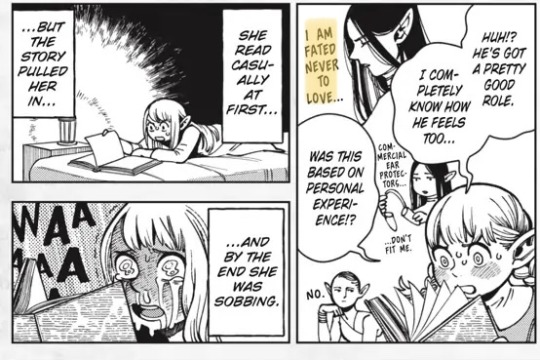
Even if the context here is explicitly that she relates! Which, she finds being able to relate to them comforting and a positive point so it being a "type" thing isn’t fully off- but this is what I mean when I say she always keeps a film of emotional distance from people, she wants to love and be loved and know people on the deepest level possible so bad but it’s something that scares her too so she prefers to chase after the safe: the unreachable- the fictional. Like Chilchuck. Bit of tangential speculation, but she wants to crack his shell and make him open up- but it’s also easier because he pulls away instead of pulling in/closer so the relationship is fully in her control in that way, if it weren’t for the teasing… Making her into someone silly in his mind is how he keeps himself from putting weight into her words, how he gets himself to automatically dismiss the wise lessons she tries to instill to him, nope sir he doesn't have anything left to learn, he's an old crouton who understands everything there is to know about this cruel cruel life yes sir. Because trying and being rejected hurts! Because if it wasn't fated to turn out wrong, then it means there was luck or choice, and that makes failures almost more painful! But people leave!! People leave and people come back and new meetings happen and choices are good, choices shouldn't be taken away! Not like how Marcille tries to forcefeed immortality to humanity, as a dungeon lord...
The chapter ends with a panel of Marcille and Chilchuck bantering again, with everyone else going about their business seeming nonplussed while the two are being very loud as if to say, ah, classic them. Return to normalcy, return to their usual closeness and shenanigans. All is well.
The Princess imagery
And now we’re falling into the rabbithole. Imagery doesn’t have to be anything more than imagery, but I discuss romantic connotations in this section (amongst the platonic reality of things ofc), you can skip to the conclusion if you’d rather but you will miss important analysis of the dungeon lord balcony scene, a big piece of the puzzle in wrapping it all up. I found the meaning of life & the world in marchil but it’s ok I get it if you wouldn’t... We're all built different ig. The character with princely chilvalrous knight parallels in the manga is moreso Laios, but Laios too breaks the trope a lot. Chilchuck gets prince and knight parallels but by contrast instead, in subtext more than any explicitly drawn. There's a lot to Marcille's princess imagery and though I've never fully covered it I try to somewhat tackle it here.
For as much as the bicorn chapter is what ends their arc about balancing pessimism and optimism and finding healthy compromises, the arc of their RELATIONSHIP is in the dungeon lord chapter where he fully opens up to her, inviting her to meet his family and all. AND MY GOD, the princess imagery!!
Listen I am trying so hard to keep this unromantic, and to be clear subtext is subtext for a reason, it doesn’t have to be concreticized or "acted upon" perse, but… I think it’s there in this scene, at least a bit. I’ve spent a long time trying to pin down what was so charged in it, besides both of them blushing, despite him offering for her to meet his family, despite it calling out to a genuine deep instilled desire in her heart enough for it to work- for it to make her turn towards them, despite the first thing she does after is shower him in romantic gifts, and it eventually struck me… It’s the parallels with other media, with tropes!! This is HIGHKEY Romeo and Juliet type shit!!! The stuff you see in every couple new kinda trashy romance kids movies! A lady, stashed away in a high tower by her lonesome, waiting for someone to call out to her from below… Romeo courting type shit with a heartfelt spiel implicit confession from underneath her balcony, offering him flowers because he succeeded in calling out to her heart…….. And they have to CLIMB to her.
Remember her succubus' words? "Oh, princess... I can't believe you slipped away from the castle yet again... Honestly, what in the world shall we do with you...? Come, let us return." Again like with her succubus, she’s living through a storybook trope but with Chilchuck’s twist, more nuanced and realistic yet just as meaningful, even if it isn’t strictly OR at all romantic and if it’s more complicated and less glamorous. She’d have to peel the layers to get to the vulnerable truth of it, like anything else. I'm just gonna drop this here...

Doesn’t it sound like a proposal. One that’s both so storybook-like, and contrasted with such real yet unromantic and grounded words, all about the implications rather than in your face grand gestures "Don’t you want to meet my family?". They literally have an arc about the topic of romance and this is the climax/pinnacle of it like god?? I’m not saying this was all intentionally crafted to be romantic but it nonetheless exists in the subtext, ripe for analysis. Of course they talk about planning together his reconciliation wit hhis wife, but the same thing happens regardless, he fully lets her into his life.
And again there’s something to be said about how that is what makes her finally turn around! This is extremely meaningful not only to Chil but to Marcille, the enticing thing that finally hooks her, gets her to finally look down at them. An offer to meet a flawed man’s flawed family, to help him mend it and its issues. It isn’t through the filter of a book, or mere gossip to her, she knows this man and she wants to be involved in his life, to know him and his family herself, ready to meet them and form connections. The clumsy, imperfect reality of a friend telling her he’ll let her into the other spheres of his life even if that means she witnesses the embarrassing and the ugly. It’s vulnerability on both their ends, offered and received, a gambit that was worth taking, both in the moment to talk Marcille out of being dunlord and long term of letting her in to see the deeper sides of him, there are take backsies once someone knows something about you after all. SHE STOPS BEING A DUNGEON LORD IN GOOD PART BECAUSE HE TOLD HER HE'D LET HER INTO HIS LIFE. SAY IT WITH ME, A FLAWED REALITY IS WORTH IT MORE THAN STAYING IN FANTASY!!!! In denial of reality, both that Falin hasn't grown older, that everything can turn out perfectly, and that everything is lost and there's nothing Chilchuck can do to make his wife love him again or even make his party listen to him.
Chilchuck says this after he sees her materialize her parents as doppelgangers. And so he goes on to say- hey your family will never go back to how it was when you were young, my family will never be what it once was either, but we can both move on and make the best of what we have anyways, isn’t that what you taught me, there are more out there! I’m opening up myself to new relationships and friendships because of your pushes, and now I want you to do the same! Life goes on and there’s always more joy and connections to be had! Stop isolating yourself, dammit!
And the thing too with Marcille’s arc is that she can’t get what she wants. She can’t. She can’t get everyone to live forever if she doesn’t take others’ free will away, if she doesn’t make the world stop for her as she plays god with the laws of nature and the cycle of life. And everyone’s important to that arc obviously, Falin during the story is the main object of that fear, and it’s moreso her death that pushes her arc along but it’s still extremely influential, Laios is the main one who sees her insecurities and talks her down, Senshi’s always harping on ecosystems and laws of nature and how resurrections aren’t natural and is there to offer comfort and support, Izutsumi’s someone new Marcille gets to take care of and her farewell talk with her reveals a lot about how she’s grown, but seeing this it’s easy to see why Chilchuck is paired off so much with her on their respective arcs, right? The one who tells it harshly how it is even when the reality is unpleasant, who gives up quickly when it's about things turning good for him but who always pushes and fights on when it matters with the party, who challenges a rose tinted glasses perspective head on.
He looks nothing like a knight but he still acts like one. He’s nothing like a prince or a dashing romantic courting lover but still he gives her a novel worthy balcony heart to heart scene. He’s painfully real and raw but she does bring that twinkle of hope and romantization that makes the world feel more wonderful to him, but like she tells him, he’s virtuous and he should give things a shot because people see good in him too and not only the bad he always shittalks himself for, she’s not making it up, he always had that sparkle of knight and prince in him.
Like, giving someone a handkerchief is literally a romance trope associated with nobles and princes. And Chilchuck has offered Marcille his handkerchief at least twice! The second time in the cockatrice chapter as a bandage. He keeps it in his pouch, with his tools, like the most must-have to offer it Marcille at any moment, ha /j. Prince behavior <3 The neckband like a knight’s favour, a token from a loved one he cherishes above all and keeps on himself at all times... Which I'll remind in her Chilwife roleplay she directly theorizes she was the one to knit it for him! Beautiful story tropes shit.
He IS a prince figure instead that now it’s not about idealizing the grand and overt it’s about romanticizing the small things in real life!! About finding joy and beauty in things that seem normal or mundane and uplifting them to make the world feel kinder!!!!
And man this whole angle makes the "Don’t you want to meet my family?" "-gasp- I really do want to! -turns away from eldritch power and living in her demon-made dreamscape that can allow her to live in fantasy to instead go back to flawed reality with her friends-" all that more meaningful and striking. A fitting end to her arc, a fitting hook to get her to turn back towards her and tempt her to give up on being dungeon lord. It’s always been just asking things and anecdotes about him and his family, never talking about meeting them, but by having someone so "fated with doomed love" open up and reach out to her "fated to never love", she opens up too, is willing to take the risk that any relationship entails, the same one that he took by offering it, the same risk they’re both averse to and scared of, loss and rejection. By actually meeting his family she involves herself in the stories she creates. It makes them real. She’s finally involving herself intimately with others, despite the real threat of loss that she will have to experience, wether through time and death or rejection.
Marcille and Chil’s arc, man…….. See, this is why I’ve been tilling the fields of that analysis for months this is why I’m insane about them, not only is there so much to say but her relationship with Chil straight up deconstructs her perspective on the world as idealized and influenced by fiction and fantasy and optimism. Like, he’s at the core of that part of her arc and man!! Man.
And the way that this is the culmination of their arc together… Like the ‘Chil calling out to dunlord Marcille on the balcony has Romeo and Juliette romance novels imagery’ take is one thing but the ‘their arc is about growing to see beauty even in the non-idealized, in the flawed and in the real’... It makes it so so perfect if she were to lower her ideal from a perfect elven prince to a virtuous halfling man (which she does romanticize).
So she doesn’t want a prince, she doesn’t want a general, she just wants this guy she knows, this friend she trusts as reliable, who has good intentions even if wrapped in unpleasant demeanor, that’s all she needs to be content and well and feel safe. By the end, he might even have become something of a prince charming to her, won over with heroic acts and virtues.
After all- Remember when I said she wouldn't be able to be as touchy so lightheartedly as before with him? Well wrong, apparently! This parallel from chapter 23 just before the red dragon fight vs chapter 96 at the final feast confirms that her like of him and behavior with him was unconditional of him being a kid or an adult. Marcille is just Like That and that she just likes him. A good part of what reads as infantilization truly is just how she cares for people in general.

Conclusion
She’s afraid of change, so it's only fair that he would be perfect to teach her a thing or two. She had fantasies but he had experiences, both had bias. Their arc is about how bitterness isn't an efficient solution to hardships, about how assuming the worst from everything is a trap that doesn't reflect reality either, a trap people fall into just as much as rose tinted glasses.
Their arc is about how relationships need work and how it's worth the effort! You can overwater a plant but you can also neglect it, to find a balance between each's needs can be hard but is always important. Friendships just like romances shouldn't be taken for granted, and doing the extra steps of deepening your understanding of others and opening to them is rewarding.
Their arc says that love is a beautiful thing regardless of loss. Something both of them needed to remember. Life isn't like a novel. Sometimes an ending ISN'T satisfying, you don't get closure and it might not even be happy, but that doesn't mean nothing can end well, doesn't mean every farewell is bitter. Peace is worth both fighting for and making for yourself. You can't shut yourself off from the world because things sometimes hurt, there's more of life to live- won't you come meet my family? Won't you meet new people, won't I try to mend relationships that are dear to me? My family is flawed, but it's still worth meeting, still worth loving, still worth fighting for and keeping even with all its flaws, no? Elven storybooks don't feature half-foots, but they're worth spinning grand poetic and romantic tales for all the same. Life is bittersweet, and that's an acquired taste to have, but one good to be able to stomach as a whole.
There’s a lot of reasons why someone would love fictional characters but be afraid of love in reality, not unlike with Laios' and Chilchuck's own experiences love has a layer of danger and fear because it can hurt to love and it can hurt to be loved. People can leave you, and in Marcille that fear's mainly through death but for Chilchuck that’s through just… Leaving. Through giving Chilchuck optimism and hope, drive to keep going despite these realities, she’s also growing to be more comfortable with the thought of relationships ending and moving forward regardless. And I do think that was part of her arc of growing to accept that Falin might be dead dead, I think Chilchuck was a big part in that. Falin is the passive object of the arc but Chilchuck is the active actor pushing it along, in a way.
Because people can always leave, Falin will leave to travel the world, but she might come back- and that's okay. And that’s exactly the thing that the story wants Marcille to make peace with! Falin wants and needs to leave and Marcille needs to be content just taking what she can get, wether it be time with people or the boundaries they set with her. THE BOUNDARIES! THE BALANCING OF OPTIMISM AND PESSIMISM! IT'S CHILCHUCK'S DOING!! "The world isn’t all good, but you should be able to see the bright side of what you do get" is what she and Chilchuck learn. To learn that she can still enjoy when she is there, and still reach out to her and keep in touch through letters- to do what you can and to get what you can and to accept that as enough, for it to bring you the joy and peace it can. Don't push your expectations onto others, wether that's being overly intimate or overly judgemental, don't be too pushy but also don't be too afraid and not do anything at all.
In many ways even before, even on the regular Marcille was his gateway into being more lighthearted, always exchanging playful jabs, laughing at her. Teasing her because she teases him, lowering himself to her level until he looks back and realizes he’s having fun with it instead of just throwing jabs bc he’s the master of sarcasm TM.
Chilchuck smiling casually and softly, genuinely, when saying that things don’t work out sometimes, is just so powerful. From the man who always assumed the worst of everything, who always spoke of life and the world bitterly... By the end, while saying these things he’s smiling openly rather than smirking smugly. Carrying on with his go getter attitude with a touch more optimism in his heart. Now he's made his peace with life and sees the good in it, still.
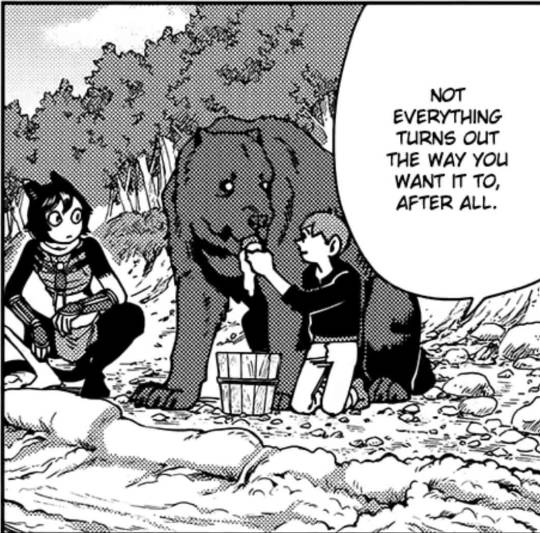
It's all about... How flawed relationships with flawed people can still be made into somehing good and healthy that make the world brighter… How flawed relationships are still worth remembering and cherishing. Except the winged lion, there to represent abusive relationships you need to fucking DITCH.
Marcille and Chilchuck’s arc is about how in life sometimes books do close and end, but other ones can open and start, and to never give up on that. People’s lives, relationships, these things are temporary and inevitably end, but there’s meaning and joy in having been there for them, and focusing on the end and the pain and being pessimistic in it doesn’t keep anyone safe, not meaningfully. "It’s not all nice like in the stories. Sometimes, a book just ends." "And another opens."
Dungeon meshi promotes the important of balance for both a healthy body and a healthy mind, and optimism vs pessimism is one such case <3
MAYBE IT'S ALL COMPROMISES MAYBE IT'S ALL SWEET INBETWEENS. Maybe we'll take our vision of what we thought we could be and make something new together! DRINK IN MODERATION!!!!!! SEE LIFE LIKE FAIRYTALES IN MODERATION!!!!!!! THE RIGHT ATTITUDE LIES BETWEEN IDEALIZATION AND PESSIMISM
Disclaimer:
This was pretty messy but thank you so much for reading!!
Thank you to @/lyril for making the more complex collages!! Check out her blog!
To be clear! Does this arc exist in the text, the whole tropes and idealism vs pessimism thing, do they have tangible impact on each other as both characters and narrative devices? Yes. Is Marcille and Chilchuck the central piece of the story? No. Is Dungeon Meshi about this and how it all culminated into a cool Romeo and Juliette scene? Lol no. Chilchuck isn't the most important person to Marcille and her story nor is Marcille the one most important to Chilchuck. Just like the other major characters in the story, their dynamic and progressing relationship is a plotline/subplot amongst others, and the level of layers and subtext it possibly has doesn't erase any other part or subtext of the story. Arcs can coexist. Multi-layered relationships can coexist. Just a reminder that this is my own analysis and interpretation of canon.
Dungeon Meshi is about food and how it ties us to a life that’s worth living, about unity and trying to understand that which you do not, to not demonize that which is different or unknown, to connect with others even if it’s hard, even if it’s in unusual or undescribable unlabelable ways, and Marcille and Chilchuck’s relationship is certainly a pawn in these themes like every other relationship.
I’m having fun, but I don’t want anyone getting lost in the sauce. It's unfortunate that to many, acknowledging there's any merit to analyzing this subtext is equal to supporting a ship they dislike, but this isn't ship propaganda, this is analysis of canon text where I happen to see a more niche angle. You can disagree with an interpretation without saying that it's nonsensical.
Like I don’t wanna say I’m a marchil truther but if you define it as believing canon does have genuine and credible basis for it then yeah I guess I am. I feel insane everyone acts like they have no chemistry and no material and??? We exist on different planets I think Like I know I implied some romantic undertone but in canon it totally can start and end at two coworkers bonding and getting to know each other better and see each other’s perspective and it influencing them both for the better. No buts, you can totally do that. Although this plus the crumbs it drives me up a wall when people say they have no chemistry or ‘how come people see anything in this pairing?’ They’re literally a comedic duo? A comedic duo that interacts so so much that gets paired off in scenes, a thematic duo which is even acknowledged and reflected in the anime’s opening. He teases her 24/7 canonically because he finds her reactions fun/cute, the only person he teases on the regular, and she’s obsessed with knowing more about him and loves being touchy on top of it, plus reads him like a book because she files away every little thing about him in her memory, like if that isn’t a strong basis for a ship I think the bar has gone too high. I’m derailing but yeah just. Do you see all of this? They drive me insane, I feel like I’m reading the necronomicon when analyzing them, picking up on subliminal messages, I keep always seeing new threads. And it’s been my otp for like 2 years now, idk when they’ll stop having a grip on me but????? There’s just so much to dig into with them. There will never be another pair like them. Do you hear me there’ll never be another duo that hits all of these like this, do you see this insanity? They are my lifeblood and if i’m eating up anything them-related it’s because they’ve earned it so hard tbh. So yeah if I’m ever dramatic about marchil it’s because I have this 100k words novel narrative in my head and marchil is the meaning of life to me hope this clears it up
Which on that note idk what or when my next Marcille & Chilchuck analysis will be. I might very well make a bite sized, summarized version of this analysis because asking people to read all of this is kind of insane of me... And full disclosure I’m also very likely to edit points in or tweak bits every so often in this analysis because idk if I’ll ever stop thinking about it, and phrasing can improved. This has been in my drafts and outlined more than a year and I’m literally still adding extra points save me. I might also do a different angle on their arc because here yeah I mostly just dug at the prince trope angle, at ONE of many angles... Like one interesting thread in the manga is Marcille emotionally maturing and becoming more like her mother, on top of her regularly being a mom type friend the way she looks after Izutsumi and Falin, which could be interesting to pair with the fatherhood of Chil. Hmm. Anyways
And obviously do whatever you want, but this analysis and all is why I personally can’t stand the fanon that Chilchuck and Marcille have a father-daughter undertone. It goes against their arc together, which is explicitly, literally about her acknowledging him as a man, an adult, about coming to see each other truly as peers and her coming to validate him as an adult, then a father and husband from an outside perspective and a friend, and inversely him coming to not belittle her profession and philosophy. Their whole arc is about learning to see each other as an equal and equally value each other’s perspective and opinion. You could argue it’s also the arc that happens with Izutsumi, but honestly with her it’s a lot about Izutsumi learning to compromise and others instilling lessons to her onesidedly while learning to respect her perspective and boundaries, it’s not nearly as much of a reciprocal thing. Izutsumi needs to be heard, but she also needs people teaching her and guiding her. Imo it cheapens the arc, the whole point is that they’re just two people who grow to see each other as equals, that the Laios party is coworkers turned friends. Marcille doesn't need a new parental figure, she needs friends who'll keep her in check the same way she does them.
I do love the way that the manga avoids romance. For every romantic undertone there’s a platonic explanation that is just as compelling and especially to this degree it’s both rare and wonderful. I think that a lot of people need to learn that sometimes ambiguity is the point instead of something that needs to have a specific objective answer. Sometimes the intent is for something to be able to be read in different ways in itself, or that the complexity of the relationship is canonically something that cannot be put into a neat box. Which! Next analysis I'm very intent on making is gonna be about unlabeled relationships in Dunmeshi and queerness, see you there!
Fast and dirty TLDR
Marcille’s personality is very serious and direct. Due to this, she frequently gets into arguments with the master of sarcasm, Chilchuck. Chilchuck views Marcille as “the friend who cannot shut up”. He is often the practical foil to her more imaginative or idealistic views.
She actually thinks very highly of him! "He’s usually the most mature one of us" "he’s dependable, we’re counting on him" "No chilchuck is definitely virtuous", and at first it’s also through this twisted lense that he’s a kid, like she has to put people into boxes so they’re more digestible, tropes, in line with aesthetic, and at this stage it’s hard for her to see Chilchuck as being even able of wrongdoing really. And gradually that gets challenged when she sees that yeah, he’s an adult, and then BAM bicorn chapter- Because by then ok fine he’s an adult, but it hasn’t quite fully settled yet as we see in the shapeshifter chapter and she still has a warped view of him a bit, she has an accurate grasp on his behavior yet still sees him as a little angel. And then she "learns" he committed adultery. Her esteem for him hits rock bottom and she spends the chapter cold to him, she still cares and comes running when he’s hurt, but she’s set on mean mugging him, until it’s revealed that- He didn’t actually. Oh, actually he just has family angst. And she starts roleplaying and having her novel vision again BUT THIS TIME HER MIND VISION OF CHILCHUCK IS OVERTLY FLAWED. He’s angry and his wife left him, he’s *flawed*, but he’s still worth hyping up, still worth having his own romance story, still has a shot of winning back his beloved. She sees him for what he is, human and real and not a carefully scripted character that fits an aesthetic, and she thinks it’s still worthy of love and admiration, worth fighting for.
The prince charming figure has importance in Marcille and Chilchuck’s arc, where she romanticizes things to a sometimes worrying degree or idealize people into something more poetic, easy and digestible (like Chil being a kid, and then him being a virtuous ✨✨✨husband), and where she needs to learn to value aesthetics less and actual acts and facts more, be more grounded (like seeing people for what they are flaws and all, but seeing their virtues too, like accepting that people need money and not pulling through on principles of honor or unity shouldn’t get Namari shamed) and a part of that is accepting that Chilchuck is BOTH flawed and virtuous, a loving husband that still has shitty moods and fumbled his marriage so bad etc etc. So it’s like, her image of perfect prince charming that will whisk you away on an ethereal romance -> realistic flawed middle aged dad with personality issues and a failing marriage but who still is worthy of love and having his cute grand romance story and his happy ending.
Their arc together is literally learning to 1) see each other for how they are and not undermining their qualities and capacities etc etc while still not leaving flaws unchecked either and 2) opening up to people. Marcille LITERALLY makes Chil open his heart up to hope like idk man. What do you want from me. He’s literally the guy helping her through deconstructing novels and fantasy and rose tinted glasses and like. Deconstructing the prince charming figure into something more real but still a virtuous husband like KUI KUI STOOOOP STOP I’M ALREADY HOOKED I’M ALREADY-
#Dungeon meshi#delicious in dungeon#analysis#character analysis#Meta#Marcille donato#chilchuck tims#dungeon meshi manga spoilers#spoilers#The day has finally come#Initially I just wanted to share the kabru bit but then I realized that you need so many building blocks to see my vision oogh#Marchil#Marchil bc the analysis is about their relationship in canon not bc this is a truthism post to be clear. Pls give this a chance#if i've ever managed to amass good faith with you and the topic interests you even just a bit please read this... Please maybe perhaps...#Y’all know me i analyze every second of chil’s life. Would I stab you in the back. Trust meeee#I’m here for a fun time pls pls no sending me hate just take the hot take or don’t#If you wanna know why i’m most brainrotted about marcille n chil in dunmeshi this is why!!! This!!#'what do marchilers see with their special eyes' GESTURES TO THIS!!! Welcome to the marchil necronomicon#started this analysis in january of 2024 send help#Flexing my literature analysis diploma… Insane overthinking shit layers deep like we did in college.#Dragging the subtext into the light-kicking screaming#this is so long and wordy sorry i'm attempting to communicate why their arc is so magical to me. Also I don't want my post to be misconstru#Fumi going deranged simulator descending into madness. This makes me ILL and TINFOIL HAT whenever I work on it like oh my god#RATTLING THE BARS OF MY CAGEEEE#it's all connected it's all So Much they make me want to BARF so much my mind expands. help#They were literally (narratively) made to complement each other and change each other for the better I'm so okay#fumi rambles#Man Marcille’s “from idealizing him to liking him even for all his flaws bc his personality is often kinda shitty” arc#and Chilchuck’s “prejudice against elves and mages into respect and trust” arc are everything to me#“Come back this instant *princess*!!! Smh smh what are we going to do with you” reenactment of the dunlord scene in spirit <3
159 notes
·
View notes
Text
there is interesting johndean subtext and insinuations across kripke era, usually through an antagonist insinuating parent-child sexual violence in order to exert dominance over dean. this type of mockery exploits that ambiguous relationship between john and dean and reminds dean that he never had a normal relationship with his father, and that makes him gross and wrong. it doesn't actually matter in the end whether john was sexually abusive to dean. the core of their relationship was damning enough: dean was made to take the place of john's wife—to comfort john and raise sam—while simultaneously being his son. the codependent nature of their relationship implies the incest that underscores their dynamic. again, this is regardless of what literally occurred between dean and john because there is enough doubt toward the nature of their relationship that multiple antagonists can use it against them.
sonwife, brotherhusband—dean is stuck in a liminal space between family and lover and is unable to put his feet firmly on just one side and instead has to accept both together or abandon both together. he doesn't get to have a relationship with his family without it being simultaneously incestuous. he plays the role of wife to john and mother to sam as mary's replacement; he therefore becomes more than a son and transcends the boundaries of the familial into the incestuous. it's baked into the dynamic and he can't hope to escape the liminality in which he's stuck without abandoning his entire family altogether.
this ambiguous relationship is further acted out with sam, where people perceive them as lovers rather than brothers; where their mutual devotion trumps, neglects, and disallows any other close relationship outside each other; where their physical closeness is viewed through an unusually sexual lens despite no literal sex acts between them taking place on screen. once again dean is stuck in a liminal space, paralleling the ambiguous and uncertain relationship he had with john.
in the end, sex (and sexual violence) is just a symbol of this codependency and uncertainly incestuous dynamic. sex acts in kripke era end up being symbolic: misinterpretations of sam and dean's relationship; accusations of sexual violence; literal, on-screen sexual moments between the brothers and someone else. it's a literary device that highlights the incestuous themes of the show. dean hand-picks women for sam to fuck because it allows dean to be symbolically part of sam's sex life. henricksen accuses john of raping dean because it is a symbol of the unhealthy, codependent relationship dean had with his father. the samulet stays on during sex because sam is symbolically integral to dean's sexual gratification (seen too in the way both dean and cassie in 1.13 appear to kiss the amulet at least once in the dark room). sex is used to signify more than what's literally on the screen, and the connections between the literal sex acts and the blurred lines of dean's familial relationships allow for a reading of incest between both john and dean and sam and dean.
it never mattered whether johndean or samdean had a sexual relationship in the canon because that was never the point. the point is the liminality that permeates the narrative. sam, dean, and john all stand upon a threshold between acceptable and taboo. the point of it all is the doubt and anxiety, the are-they-aren't-they that is never answered. the absence of incest within the text invites the understanding that the incest was, in fact, always there.
#supernatural#wincest#samdean#johndean#i've been thinking about this yesterday since i talked about it with mac#figured i could share it here too and hopefully move on lol#i tried so hard to make this easy to understand but i fear that i will be misinterpreted nonetheless#i suppose that's what happens when your topic of choice is literally Doubt Uncertainty and Liminality#i focused this on dean's relation to the liminal incest of the narrative only because he's the common thread between johndean and samdean#obviously sam dean and john all equally occupy the liminal space here#dean simply worked as a good focal point through which i could make the argument#.txt#spn posting
582 notes
·
View notes
Text
obviously i have my biases, but i'm just curious.
a bunch of knights go through grail quest, but what i want to know is your preference for the GRAIL HERO specifically. bonus points if you tell me why!
as a refresher, here's all of the relevant texts they show up in and undergo grail quest
Percival
Peredur (Welsh) Y Seint Greal (Welsh) Perceval + Continuations (French) Parzival (German) Parceval (Norse) Perchevael (Dutch) Prose Perceval (Middle English) Perlesvaus (French) Merlin and the Grail by Robert de Boron (French) Le Morte D'Arthur by Thomas Malory (Middle English) The Quest for the Holy Grail (Vulgate) (French) The Quest for The Holy Grail (Post-Vulgate) (French) La Tavola Ritonda (Italian)
Galahad and Bors
Le Morte D'Arthur by Thomas Malory (Middle English) The Quest for the Holy Grail (Vulgate) (French) The Quest for The Holy Grail (Post-Vulgate) (French) La Tavola Ritonda (Italian)
Gawain
The Crown by Heinrich von dem Türlin (Diu Crône) (German) Perlesvaus (French)
Lancelot and Arthur
Perlesvaus (French)
links are supplied by the Arthurian Preservation Project!
#arthuriana#arthurian mythology#arthurian legends#sir percival#percival#sir galahad#sir bors#sir gawain#sir lancelot#king arthur#percival in everything its absolutely ridiculous lol#also i don't have a link to dutch percy (YET.) but i know it exists its basically another translation of chretien#anyways should go without saying that percival is my favorite grail knight. just look at how many texts he's in#he's also the original ; the grail quest and even the concept of holy grail itself would NOT have existed if it weren't for percival#like the holy grail has become a part of english vocab and is so massively influential in soooooo so many ways#like IMO if you ask me; galahad may have replaced percival (very loaded topic that i'll get to one of these days) in lancelot traditions of#the grail quest ; he would not have existed if it weren't for percival#perlesvaus percival is pretty much protogalahad tbh#even didot percival as well the whole prophesied good knight and descending from joseph of arimathea and specific plot points#such as the mending of the sword etc etc#all came from percival directly those are not unique to galahad#but those are my reasons as to why i think he's the best and my favorite i do think all of them are interesting and unique#and have serve their own flavor of the narrative#even arthur lol like arthur is so good in perlesvaus its crazy
101 notes
·
View notes
Text
joe'marr bengals reunion — a (somewhat) comprehensive timeline
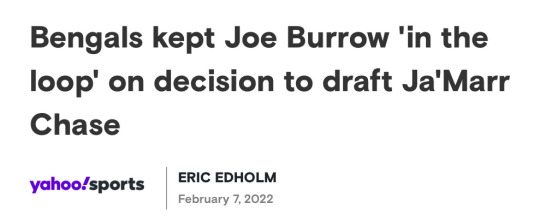
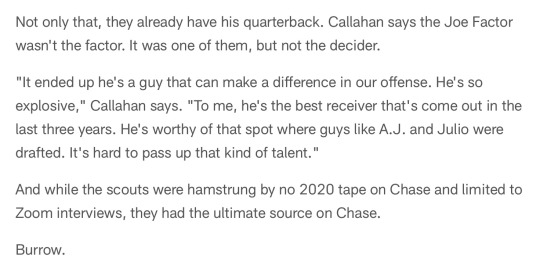
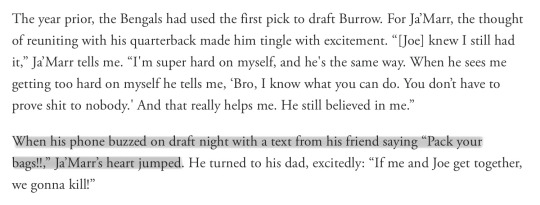
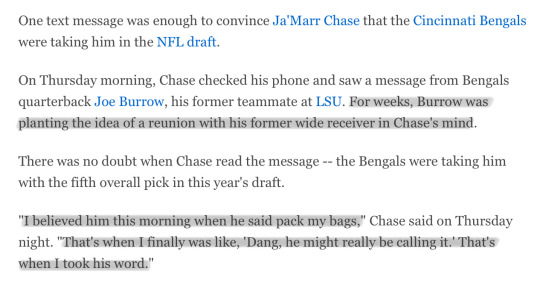
1 — “have you spoken to the cincinnati bengals and what would it mean to reunite with joe burrow there?” — “i have talked to the bengals. i don’t know how many times i’ve talked to them though. but, me and joe, you know, i wouldn’t mind going back with joe. if we go back together we’re trying to do nothing but get back our chemistry and have some more fun.”
2 — “i'm really excited for this draft. i don't really know what's coming but, you know, if me and joe could get back to it... i’d love to have some fun with him again.”
3 — “i assume you'd be okay with a potential reunion in cincinnati if that were to happen?" — "yeah, i wouldn’t mind.”
4 — “me and joe talked about [a reunion] maybe like three, four times actually. we talked about it a good bit of times. he texted me this morning, just letting me know: ‘get your bags packed’, so i guess that meant that was gonna be the pick. i don’t know if that was a hint or what. so, he sent me that little text this morning, i was like ‘okay… i'm ready, bro’.”
5 — “what was your reaction like when he was lowkey recruiting you?” — “i actually was believing him sometimes, sometimes i was like ‘stop playing with me’ and sometimes i was just like ‘okay bro, i gotcha, i'm ready now’ so. i believed him this morning when he told me, you know, pack my bags. so that's when i finally was like: ‘yeah he might really be calling this’ so that's when i took his word.”
6 – “jimmy burrow, did joe tell you—he’s always been kind of coy about what he said to the bengals—did joe tell you that he wanted the bengals to select ja’marr?” — “yes, i think we figured that… and eventually… yes, he pretty much told us that he wanted ja’marr.”
7 — “it was like a week before the draft, ja'marr said: ‘dad, joe texted me.’ […] he didn't say what he said, you know. but he said: ‘joe just texted me’, [...] so he had talked to joe like... or texted with joe once or twice that week. and then he told me, he said: ‘dad, if i get with joe, we're gonna kill’ [...] so he was all excited about getting with joe.”
8 — “what was the first thing joe texted you when you got drafted by the bengals?” — “make sure your bag's packed and ready. yeah, that was what he told me.”
9 — “the cincinnati bengals are on the clock now. earlier that morning, i had got a text from joe. he said: hope your bags are packed. i know it's me, at the moment, that's what i'm saying to myself. i can't wait to be a part of it.”
10 — articles: 1, 2, 3, 4
#wasn’t gonna post this#but then one of my friends asked me about the whole draft-texting-reunion-saga#so i tried to compile a timeline#added it to the joe’marr google doc that i made for my friends (who WILL be turned into nfl fans even if it's against their will)#and then i figured i might as well edit it together and upload it cause i do kind of wanna have this on here#anyway i guess the timeline on this is#some very limited communication between them during the season#as evidenced by that one pre-draft interview with joe in which he was like ‘yeah we still talk now and again’#then the frequency increases a little bit as they're starting to realise how well-positioned the bengals are gonna be in the upcoming draft#joe is reportedly being kept ‘in the loop’ re: the drafting/scouting process#starts seeing a real possibility of playing with ja’marr again#and begins cautiously mentioning the idea of a reunion around ja’marr#who is clearly a lot more hesitant unsure guarded etc etc regarding the whole thing#doesn’t know if joe is being serious maybe doesn’t wanna get his hopes up and risk being disappointed#(‘sometimes i was like stop playing with me’ and: ‘i didn’t believe it but then he provec me wrong’)#and then ofc the whole thing culminates in the text joe sends him#sidenote: i love ja’marr’s somewhat inconsistent narrative here#(i'm saying this as if he doesn't ALWAYS have theee most unrealiable narration lol)#like........ was it the evening before….. or the morning of.…..#and what exactly was the wording of that message#because he keeps alternating between ‘we're coming to get you’ and ‘make sure your bags are packed’#truly one of my favourite aspects about this ship is how much detective work you gotta put into#figuring out what the hell is going on between these two#which is made considerably more difficult by joe never commenting on these Highly Important Topics#and ja'marr who will truly just. say anything.#ANYWAY enough rambling pleeaaase let me know if i forgot anything or if you guys have extra content/opinions/interviews re: this entire saga#ja'marr chase#joe burrow#joe'marr#joemarr
74 notes
·
View notes
Text
i literally cant stop thinking abt lambdabern in ep 5. imagine you write a love letter to your crush invoking the interest you shared begging him to see you through all the obscurity you’ve shrouded yourself in and two lesbians read it decide thats boring and not only scribble all over it in crayon but also cut it up dada style and rearrange it into self insert fanfiction
#umineko spoilers#.me#umineko#topic: narratives#ep 5 is one of my favorites and least favorites at the same time but the warped aspect of it is so freaking fun to me#also the actual story lambda’s telling on the gameboard using sayo’s pawn is sooooo. accomplice battler……giggles#I know I know game without love not what sayo would have wanted etc etc. still loads of fun to me. and lambda…hehehe
45 notes
·
View notes
Text










more of this one i'm quite fond of her
#limbus company#limbus ocs#sketch#traditional stuff#lcb dmitri#yes i made her almost exclusively so i have a design to draw rodimitri yuri with later. so. sorry.#or look forward to that. im drawing it either way#anyone who has read the book probably saw this coming and you all should unfollow me now#i actually like that one line about wine so much that i want to incorporate it into a base ego mockup somehow.. more on that later#self-indulgent bullshit i love you forever!!#on the topic of self-indulgence though#the reception of girlclair has been surprisingly positive#not that i thought people would react negatively#i just figured it'd be more along the line of indifference. so! better than i expected!#thank you. i read all the tags and i love you<3#now here come the real flop posts with an audience of one#girl who doesnt even exist tangentially to canon#yet. YET. she's gotta show up eventually. at some point#not if. WHEN. please they seriously can't just remove her i'm on my knees#i know they might change/cut characters for narrative purposes à la canto vi. but please. they have to keep dunya and mitya pleaseeeeee
74 notes
·
View notes
Text
honestly the older ive gotten the more ive become disillusioned with 'xyz white character but now they're brown!' and it sucks because i absolutely do not mean it in the usual 'weh weh making everything woke' way but rather that many people who seek to diversify casts of mostly white/pale people never think through the cultural implications of what they're penning down yknow. like to be honest if you just pick up a white character and go 'theyre brown now look at my awesome redesign' i kind of feel nothing because textually that is just a white person wearing the skin of a poc and it's not like. representation. at worst it gets straight up tokenising. maybe it's just because it's actually very easy to find 'diverse' media that is not written by some white dude that is writing every character from the perspective of a white dude (there are so many brown characters that just read as white because the author does not put any effort into distinguishing lived experiences) and i find it much more fulfilling to take somewhat underdeveloped characters that are clearly meant to be ethnic and rightfully elaborate on them rather than slap a stamp of approval on some white guy. Not to mention the fact that sometimes a character being white is actually very informative of their place in society and their inherited cultural bigotry but then people turn around and contradict that which is like, not something i'm critiquing from a "how dare you ruin this white character" standpoint but from a "you have to make very convoluted steps and bounds to explain why this brown character acts like a white bigot and it quickly gets very uncomfortable" one. yknow. and tangentially i think the same thing with people randomly headcanoning characters as trans. like sure you want to project but sometimes i think its worth asking yourself 'is this character a critique of cis white men and how does making them marginalised change the implications'. like people can have their fun but damn man sometimes it just gets in the way. does that make sense.
#very long post i have a lot of thoughts on this#like believe me sometimes im torn on this too! like i constantly think about a minor trend back in the day#that was like. oh lets make bachelor from patho central asian and its like. well being some russian white dude is fundamental to his#eagerness to be a coloniser and it directly ties into how the actual Textual indigenous people in the game are treated#and on one hand i think it cheapens everything about daniil and most importantly the poc in the actual story of patho#and the obvious thing to say about this as a general topic is like. obviously anyone can be racist. but its inherently different from a#non white standpoint. and people never accommodate for that. and sometimes i think accommodating for it#is so far removed from the initial point of a narrative that you might as well just save your points for an original story#DOES THAT MAKE SENSE. whatever.#.mid
90 notes
·
View notes
Text
"Eddie said he's straight! Buck said Eddie was straight! Buck said he's not in love with his best friend! They shut down Buddie in the show it isn't happening ya'll are delusional! Queerbait! Queerbait! Blah blah blah"
I feel like I'm going insane. I'm sure we're all tired of people shouting "media literacy" every five seconds, but like... Yeah, develop some media literacy, please.
I'm saying this as someone who doesn't usually like romance, despite being subjected to it in basically every piece of media. As someone who doesn't generally look for love stories. As someone who loved Buddie but didn't consider any serious possibility of it becoming canon before season 7/8, who refused to believe Buddie was truly happening until I couldn't deny it anymore: this episode is loud.
Please understand how narrative arcs work. How character arcs work. How character development works. How serial broadcast television works. Understand how writing works. Consider context; take the whole episode, the whole season, and the whole series into account instead of treating things like they exist in isolation.
I'm too tired to go through the step-by-step details of the episode to prove why these, "they said it on screen, therefore..." takes are shortsighted and ignorant; plenty of people have done that already.
But that episode, even if we do take it in isolation, is textbook. Do people really take everything characters say at face value? Do people not watch other character's reactions? Listen to what else is being said? Watch what is being shown? Consider the implications? Themes? Narrative devices?
Consider that maybe, just maybe, characters can be unreliable narrators, or believe something to be true only for that belief to change later. These things don't happen in one episode. There's such a thing as set-up, foreshadowing, the starting point of a plot. 911 is a serial drama, therefore it is going to have A) long-form story and character arcs, and B) drama.
Characters are not going to move in straight lines, or talk in therapy speak, or solve every problem in an hour. They are not always going to be right, or self-aware, or truthful, or rational. Direct dialogue does not equate to honest dialogue.
Also, saying, "well in real life, people do this, I do that, their feelings would be this, yadda yadda yadda" means nothing. Your experiences are not universal, and more importantly, this is a work of fiction. Realism is whatever the story says it is; it's going to do whatever creates the most dramatic, interesting, developmentally beneficial, or emotionally satisfying story. Whether you like that story or not is irrelevant to the fact that stories are not going to cater to all your expectations or real-world experiences.
To people pointing to Tim or the actor's interviews as "proof" they're shutting down Buddie: again, please understand how broadcast television works. They are not going to tell us everything that's going to happen before it happens. They are going to play the neutral zone, the "wait and see," the "will they/won't they." They are going to lie. That is television production 101. You can compare what they've said in the past with canon and list all the contradictions, misdirection, and twists you didn't see coming because they didn't spoil it for you. Watch the show. That is the canon.
They're also not catering to fandom--people they already know are devoted to the show, familiar with Buddie, and consistently tuning in. They're introducing the idea of Buddie to the general audience, people who likely haven't considered the possibility before. The GA has to see that Buddie is an option, so the show needs to manifest it as if it's a brand new concept. This episode pulled the pin on that grenade in a very obvious way; the idea that Buck could be in love with Eddie and that Eddie could not be straight has been planted. The next seed will be Eddie's feelings. Now the show needs to water it and let it grow.
One last thing. Been seeing a fair amount of hand-wringing and condescension over people interpreting this episode differently. As if this is some sort of "gotcha" for bad writing, baiting, or people being stupid. Listen, genuine complaints about this show's writing aside, different interpretations or inferences are completely normal. This isn't unique. That is how people interact with stories, through personal biases, experiences, emotions, and expectations. That isn't inherently a bad thing. It's totally fine to have your own views; media is all about interpretation.
However, it is also true that just because you have an interpretation, that doesn't make it true. Not all interpretations are equal in their validity, evidence, or warrants. The show has an intention, it has a story in mind. If you don't see it, sure, that could be a failure of the writing, but it could also very well be a failure of your analysis, especially when the show hasn't finished telling the story. Looking at one thing in isolation and forming your whole conclusion based around that makes for poor critique.
I guess we'll just have to wait and see who's right.
#911#911 abc#911 spoilers#buddie#ramblings#911 discourse#I guess#I usually keep my mouth shut in this fandom but I am exhausted#i am not working through a degree in narrative writing and media literacy to watch people fail this badly at critical analysis#also hate people shouting “queerbait” going “well as a *fandom elder* who survived destiel/sterek/johnlock/etc.” or whatever#bruh I grew up on that shit too please just shut uuuuuup#like be honest those weren't going to happen and it was obvious from watching the shows (not that ships need to be canon anyways)#I know queerbaiting is traumatizing but you have got to stop throwing that word around so casually and before the story is even finished#this is a whole different show with several established queer characters in a different era of television#the fact buddie is a big open topic of media discussion now is also huge--it's being established in the minds of the public#and yeah yeah “they're baiting” but do you not see how in this day and age queerbaiting would effectively be career suicide?#also they aren't relying on shippers to keep their ratings afloat#if they weren't going to do buddie they wouldn't keep leaving the question open-ended it's a catch-22 at this point#i know pessimism is all the rage but i'm begging you to try optimism and good-faith and maybe some positivism
98 notes
·
View notes
Text
Suwon's character analysis: From being shown to showing
Suwon is really a character all about being watched and scrutinized, isn't he?
Of course he's not self aware he's a fictional character but his position as a King and in relation to Yona ironically put him in a position that gives him a similar awareness that if he did. Suwon is judged and analyzed by everyone, in and outside the story. He knows that when he shows himself (and appears in the story) he has to perform a certain way. He has a role to follow and perform until the end. The way he speaks, the way he stands, the way he moves...being King means controlling and being aware of all of it. The moments we see through this costume are moments where he's taken by surprise and becomes "out of character" for this role. Moments where he's literally called out by characters around him for it, making him fall in his expected role more and more. He has to behave a specific way, he has to wear specific attires, he is very aware he is the object of many gazes around him. When he performs his role perfectly he is judged but in ways he expects because it's others' roles as well. When he breaks out of this role, he is judged anyways for losing himself. No matter what Suwon does or says, others will judge him or love him and expect things from him. It is true in the narrative and outside of it.
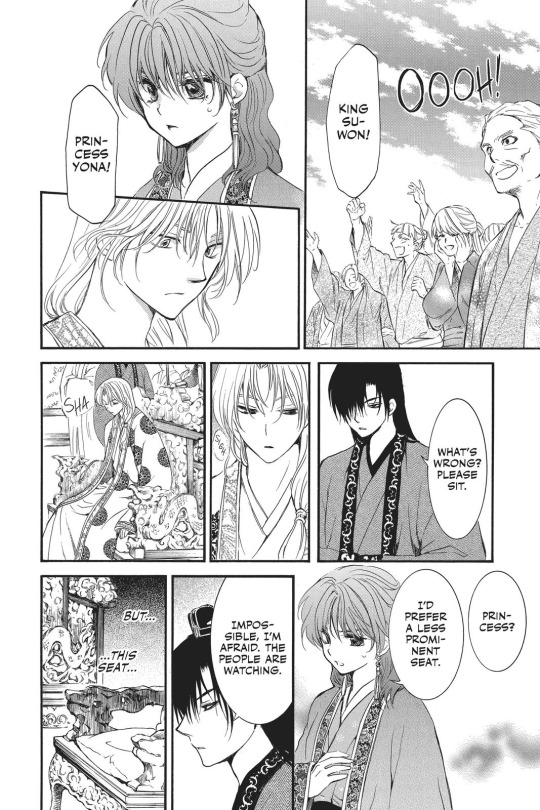
The South Kai arc with chapter 221 and 224 has him desperatly try to stick to his role that is slipping through his fingers, he has to position himself in contrast and opposition to Yona, he has to be the King his father wanted until the very end, etc. Yet, Yona and Hak kept breaking these roles as well. Hak, in full armor from Kai, the enemy, arrives and gives the senjusou to Suwon, in full King attire at this moment. Hak enters the stage like a blast when the curtains were about to fall and turns all formalities and rules of distance and what is allowed or not to dust. He breaks the role he carried until now as the character that should hate Suwon forever and try to kill him, and saves him instead. The fact that Suwon is King then doesn't really matter, Hak did this as his former friend.
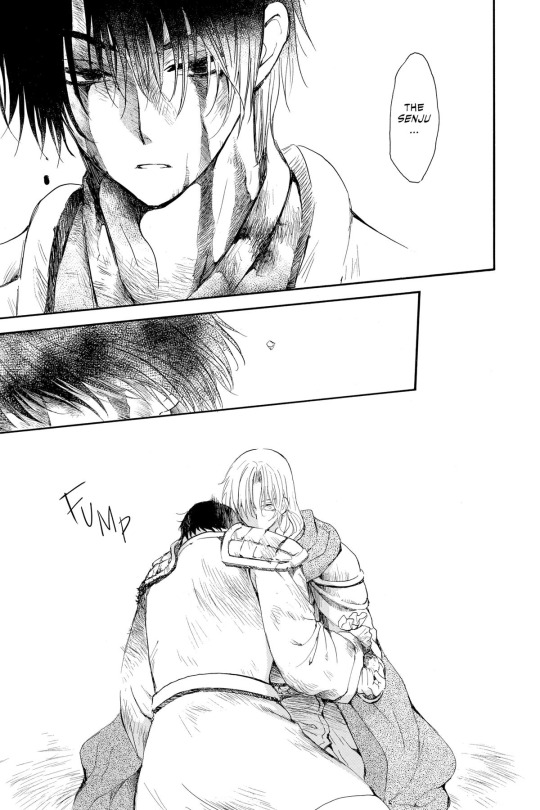
In chapter 243, Suwon wants to speak to Hak privately but is well aware that if he comes out and does that, he will be seen and judged, confirmed by the shadows in chapter 251. He is not allowed to be himself without any costume freely, hence the cloak and hood on. He is not allowed this one private moment, eyes are on him and not only Hak's that he very much expects as well. That's why Suwon's tone the whole chapter is so...ambiguous. At the beginning, he speaks matter of factly, maybe not as "Hak's King" but at least in a unpersonal way, like an anonymous messager. He tells him information. That's why he calls Yona "Princess Yona" too I think. It is Suwon trusting Hak and relying on him personally, yet he is not totally open yet, Suwon still has a role to play. The more it goes, the more the tone shifts subtlely, now calling Yona by her name, his hood falling when Hak hits the wall, and talking more personally. What he shares then is what he is resigned to do and accept given his position and role that he can't just give up on now, what is the most reasonable within the range of his actions from then on. What he conveys to Hak is that he will not break character and stop performing his role as King, the one thing changing being only how he passes it down to Yona.
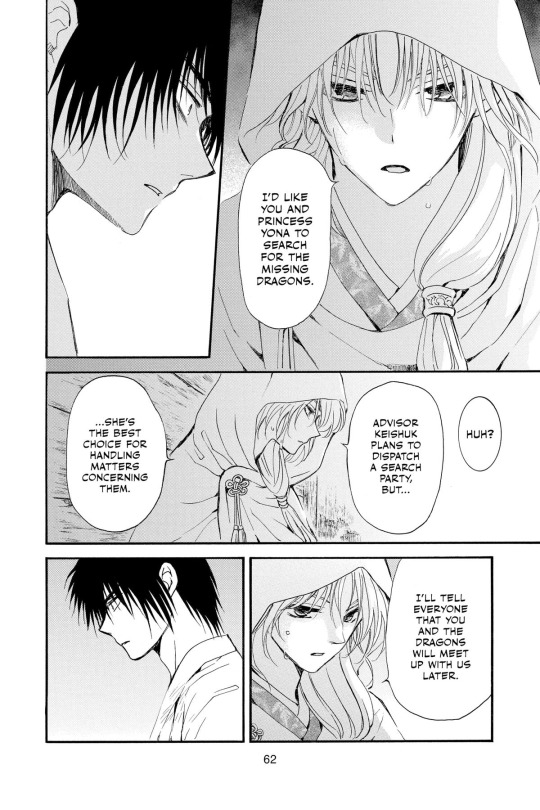
However, there is one final thing that the manga makes perceptible for absolutely no one but Hak, that even the shadows can't hear and understand. Suwon's last word(s) to Hak is not digitally typeset like every other text inside speech bubbles, but handwritten so small it looks like muttering that we can't for sure confirm the full forms of. Since chapter 243 came out, I did try for a long time to decipher it, and many concluded it could be a "sayonara" or "arigatou", and it was also translated and typesetted in the official English translation as "Farewell".
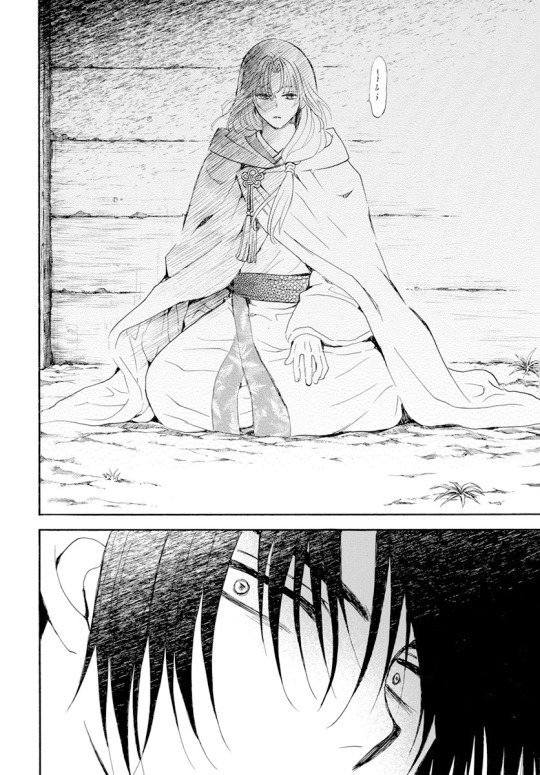
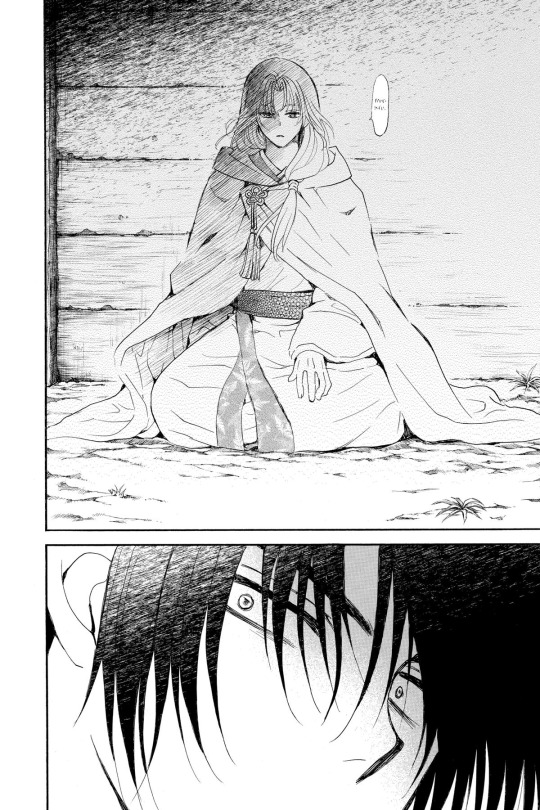
But honestly, now I think it is something we should not and are not supposed to decipher. In my eyes, it was Suwon's attempt to have just one thing, one word that would not be scrutinized and broken down to pieces by the people that watch him with no regard to his agency. The only thing we break down is the unintelligible form of it. I'm sure that we are not wrong to think it was something along the lines of a "Farewell", but I can't help but feel like it's not right to take even that from them now. This page is also the trigger that makes Hak understands that their entire convo was in itself a performance that Suwon directed from the start and aimed at people looking at them (the shadows and the audience), and the real message that he conveys only to Hak and not the shadows is that he is giving him and Yona a chance to escape and never return, despite the fact it goes directly against what he told him clearly in their conversation. I think this is what breaks Hak's heart too then, and why Hak realizes that he indeed can't dream of walking on the same path as Suwon anymore. Because Suwon will keep performing a role that will constrain him this way and make him hurt Yona and Hak. That this is maybe the path awaiting them too. The best way is to escape from it when it's not too late. It is too late at this point for Suwon though, or so he thinks. Suwon is self-aware that he can't discard them by this point, so to me this is him trying to negociate these feelings of his (by leaving them one chance to leave) with his role and constraints as a King in this complicated, indirect way.
It's very telling afterwards how the moment from chapter 243 Hak remembers is Suwon's final word that we can't read, whereas for the shadows it is the moment he tells Hak he will make Yona the next ruler. The unreadableness of the former and the enhanced size of the text in the latter...yeah. Suwon's words removed from their full context often are enhanced like that, aren't they?

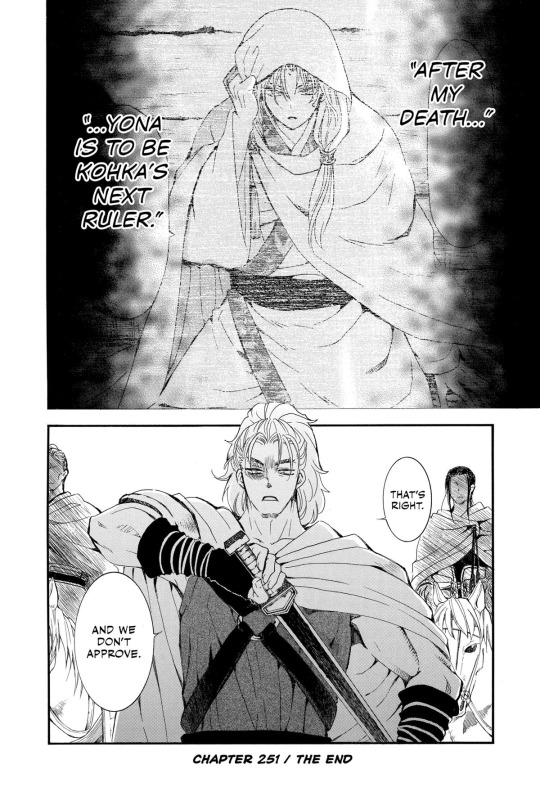
Suwon is at the same time forced and not allowed to change. He is at the intersection of clashing expectations. It is bad whether Suwon follows his role perfectly or whether he breaks out of it a little and tries something different. Suwon is cruel to Yona and Hak and should die for his actions, or Suwon is too nice and submitting to Yona and Hak (and the larger narrative). No matter what Suwon says and does, it will cause discourses after discourses from both those supporting him and those against him. It is cruel, because people around him are changing and looking him differently than before, whether it's good or bad. In chapter 242, he acts out perfectly as the determined and pragmatic King he is as always, yet now even Geuntae doesn't seem satisfied. Suwon, because of Yona's influence on the people and world around them, has also no other choice but to adapt to these changes in some ways, yet characters like the shadows that refuse any change from 10 years ago stand against it. Again, then chapter 243 to me is Suwon's way to still perform his role as expected from others by negociating with all these sides in some ways. But it's really so complicated, isn't it? And in the end, a chapter like 243 was painful and upsetting for everyone.
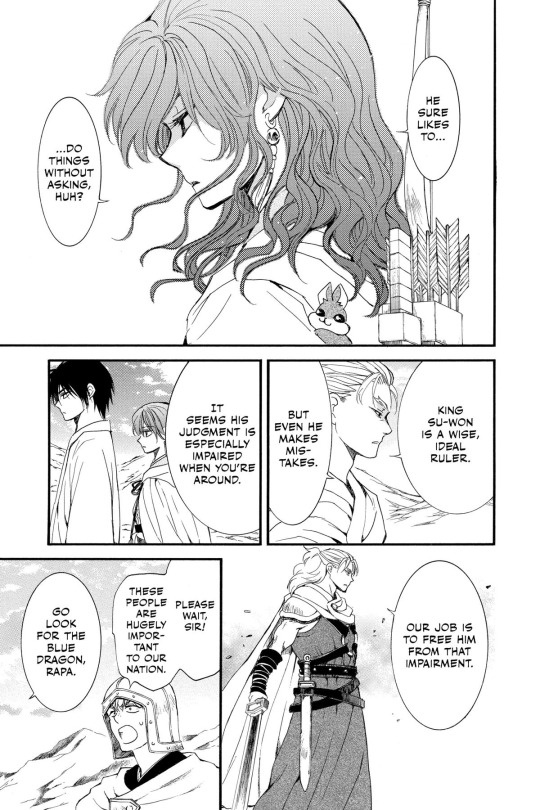
I read many people say that Suwon was not here enough in the castle arc and it was annoying that Keishuk was so much present instead, and I remember very well how desperate I was to see him more by then, but it makes sense too, no? After all, Suwon didn't want to be seen. By showing himself as little as possible only in the moments he knows he can perform well, he was still somewhat in control of what people saw of him. The illness made it that Suwon could just not perform more than he did. He didn't want anyone and especially not Yona and Hak to try to see him beyond the performance, yet they kept getting closer and closer, pushing Suwon to hide himself away more and more too.
Suwon knew very well that the second he came out in the open he was closely looked at, by Shin-ah of course, but Shin-ah is only the best example of this general feeling of being watched and judged I think. This is Suwon's interpretation of Shinah's gaze, and I'm sure there is part of truth in it but I think it is also heavily influenced by Suwon's own feelings. Suwon was judged and followed for isolating Yona when she learned of the illness and for imprisoning Hak, but those were things he was only /indirectly/ the cause of. Of course, Suwon didn't do anything to go against them and it was his responsibility this way, he knew and had the authority to decide different, but what I mean is it portrays very well how Suwon is aware, /feels/ the way others scrutinize him ever since he killed Il for every single negative (direct and indirect) consequences of all he does and is. He will never be free from it. People will never let go, even when Yona and Hak do. I think the wound on his shoulder or the pain of his illness he doesn't act on enough are also symbols of that. His present shoulder wound is the literal trace and scar of Shinah's gaze on him in chapter 249, and Suwon is okay with carrying it.
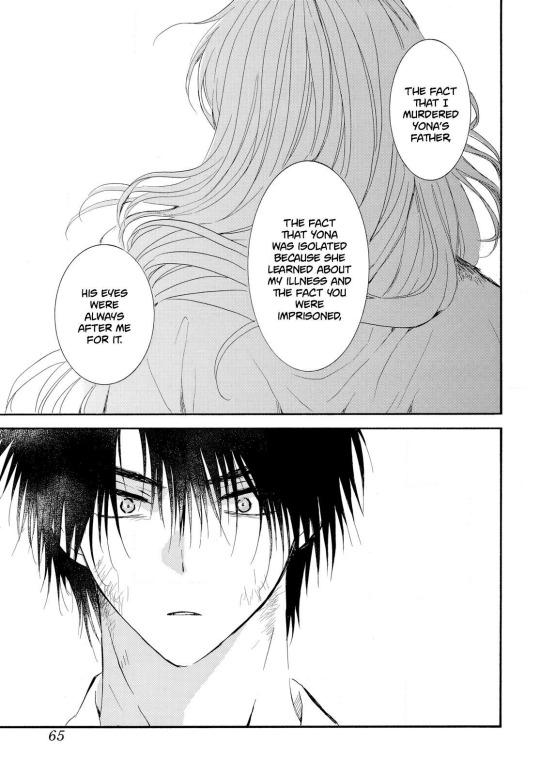
It's not like the story has never let us enter Suwon's mind before recently, after all the narrative doesn't strictly follow only Yona's POV, but Suwon from the beginning was still generally a character seen from the outside by others rather than followed from inside. All these iconic scenes of characters looking at him, whether it's only his back or in the eyes are very much about that. These scenes serve to show how Yona (and Hak) is the subject of the story and will always watch him and what he does, the way Suwon watched Il for 10 years. It also serves to confirm to him that they hate him and wants him to die, etc...
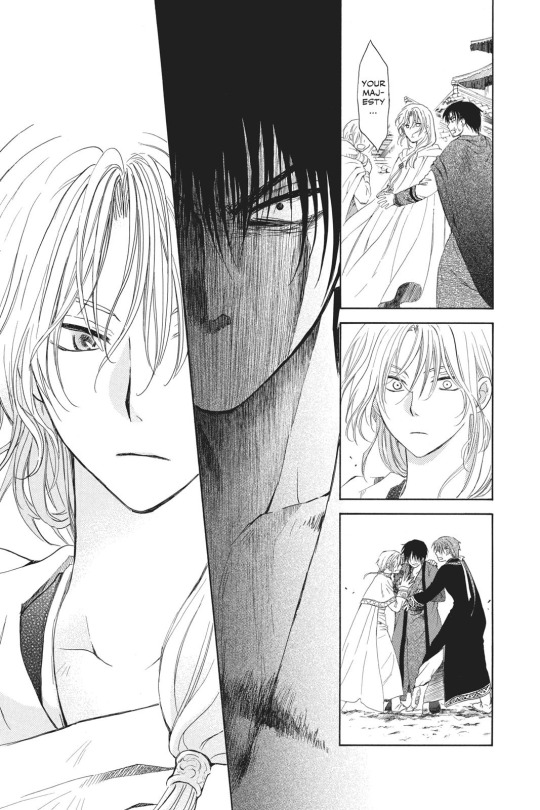
It is very interesting too that the majority of flashbacks we have of him (outside of the one in chapter 11 and some bits of ch1/185) are never from Suwon's POV, but from others and how they perceived Suwon and felt about him then. Hak in particular. Even the diary arc is not from his POV. It is always about the conflict between the characters' first impressions of him and other sides of him revealed to them later on. Suwon to characters and to readers alike is like a puzzle we try to resolve, picking him up piece by piece. Each POV about Suwon is important because he is seen differently by each character, they all see different parts of him and reveal new things about him in reaction.
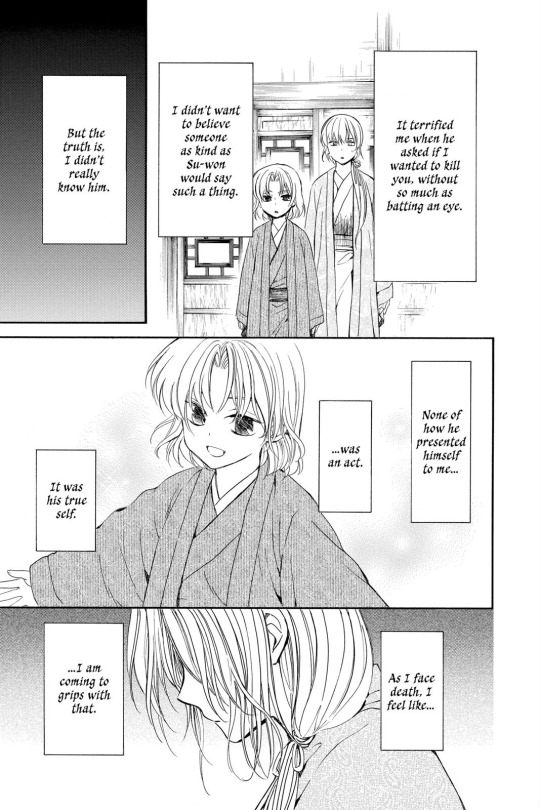
But this is precisely where we differ from the characters individually and what makes the larger narrative not solely about Yona's subjectivity. As readers we can assemble each piece in a way characters, even Yona, cannot. Moreover, we are also shown some bits from his own POV that no one else inside the story get to see. That's why honestly...I don't see Suwon as a puzzle to piece together since a long time. Of course we don't know and maybe don't understand everything about him, but the characters' struggle to understand him is quite different from readers' position when they judge him one way or the other, in my eyes. The only way I can make sense of why the story would go out of its way to narrate things about Suwon only to us when he is a character all about being shown and seen, is that at the end of the day the larger narrative is and was never against Suwon, its scope includes him too, we are made to feel for him as well. It is only so hard with Suwon because he himself doesn't let us and has circumstances that doesn't allow him that. Akatsuki no Yona is very much about Yona's subjectivity above all, but not fully and totally either and it cares about other characters as well (whether it does it well or not is another topic), and the existence of a character like Suwon we are shown glimpses of the interiority of from the very first volumes highlights this well, I think.
Despite this, the characters' struggle didn't end. And that's where the nuance between what the larger narrative of Akatsuki no Yona tells us about him and what Suwon as a character-narrator shows and tells us is meaningful. Suwon is a fictional character that depends on a bigger narrator and author of course, but there are several layers of narration in comics art, some which embrace the mind and subjectivity of one chosen character and making them "independant", agent of what they show and tell.
When we are shown what Suwon thinks in chapter 217 or in chapter 221 for example, I don't think it was that Suwon as a character wanted to be seen, but only that he was breaking and vulnerable in a way that made these bits showable to us. The fact we see Suwon's thoughts is a representation of Suwon's emotional state. It's not something Suwon has agency over at his own level. He is not a narrator in those moments, but a character being shown.

More precisely, Suwon did try to resist the narrative in chapter 217. Inner monologues in comics and especially in shoujo manga can be represented in different ways and have different functions. In chapter 217, there is a visual contrast between the thoughts that "float" on the pages, his personal lingering feelings for hurting Yona, and the thoughts in the black boxes, that have him rationalize the situation. Generally, monologues in text boxes are said to be a more objective level of narration (I get this from the "How to draw shoujo manga" book by Shigeki Suzuki, a former editor for Dessert's magazine).
Obviously, Suwon is not objective here, but it represents his attempt to affirm his authority on what is told and narrated, his control on feelings he doesn't want to acknowledge and to get out in the open. He tries to be a narrator. The metaphor of a box that opens against his will is then perfectly fitting. There are the words typed in text boxes, and the words out of these boxes. In the very next page, the boundary between panels and text boxes is blurred thanks the magic of shoujo manga composition. The first two vertical panels could very much be text boxes on their own, and what he says in them is still him being pragmatic and rationalizing what he has to do. Yet, as we see, Hak is now in these boxes as well. It breaks the illusion of Suwon as a character-narrator here (which was already hinted at by the choice to make the bg of the text boxes so dark). He can't control his thoughts from going towards Yona and Hak, he is not showing that willingly.
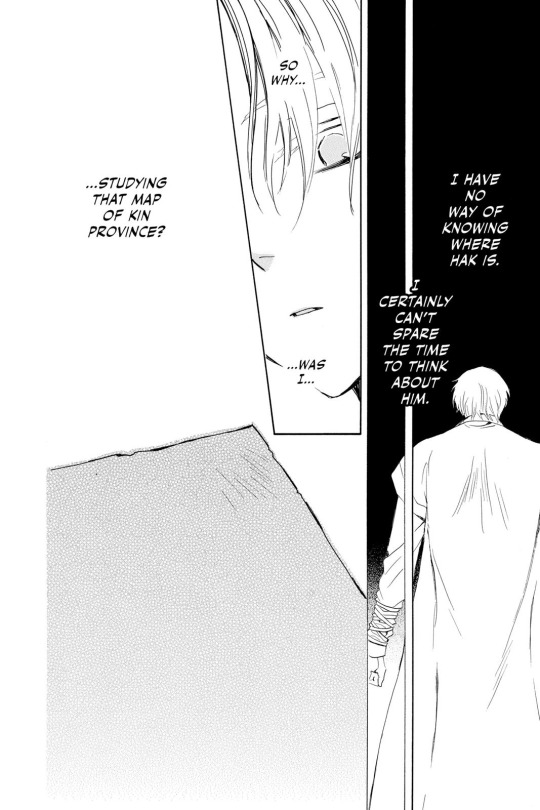
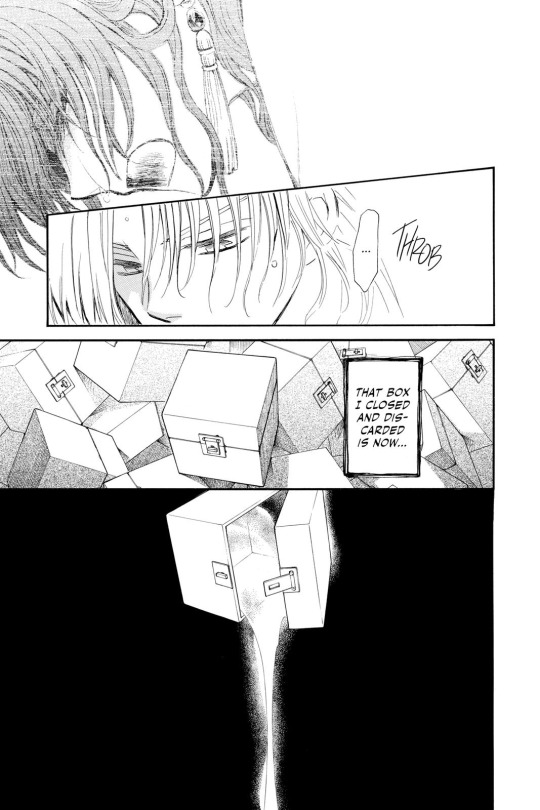
What we see inside Suwon is him still performing the best he can. It's him trying to convince himself and push himself to fulfill his duties with no hesitation. It's still not all of him, there are still things that he tries desperately to hide and keep deep deep inside of discarded boxes. Inside and outside, he has to be the perfect pragmatic King his role ask, so all that is shown has to be that. He can't allow himself to be anything else, he has to shut off and erase any trace of different voices in his heart. Yona, by being a person that expresses and voices out her feelings more, brings these feelings Suwon doesn't want to show on the page, she shows them to us. Seen like that, Yona can maybe thematically be a representation of Suwon's repressed feelings.
(A bit differently but similarly, it is a similar process in chapter 221 where this time Suwon can't barely try in any effective way to narrate what he's thinking, what we see as panels and text boxes make no difference anymore, until it blows up for good when he has this flashback of Hak and Yona from chapter 11 and realizes he can't discard them. )
So, Suwon is a character that is shown to us in several ways. One, there is how he is seen from the outside, the way characters perceive what he shows to them or what is shown about him to them. This is the layer Suwon has the most control on in a way (even if not totally), as his position in the story makes him very conscious of his obligation to perform because people are watching him. He shows his full control and flexibility of his image in the ways he willingly pretends to be more naive and weaker than he really is to Geuntae, Soojin and Li Hazara for example. He plays with others' expectations and perception of him. Outside, Suwon is already full aware of how he is supposed to present himself, he already knows what is going to be shown or not for the most part. He allows himself to break out of character when he knows no one else watches him, which are the rare moments the narrative can show him when he's not performing. As the story advances however, these moments become much rarer as he is watched closely by more and more characters in his privacy.
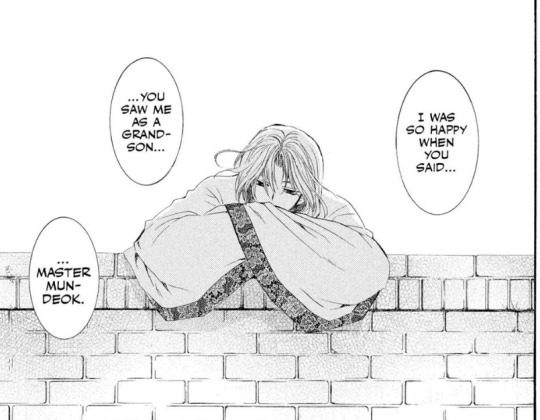
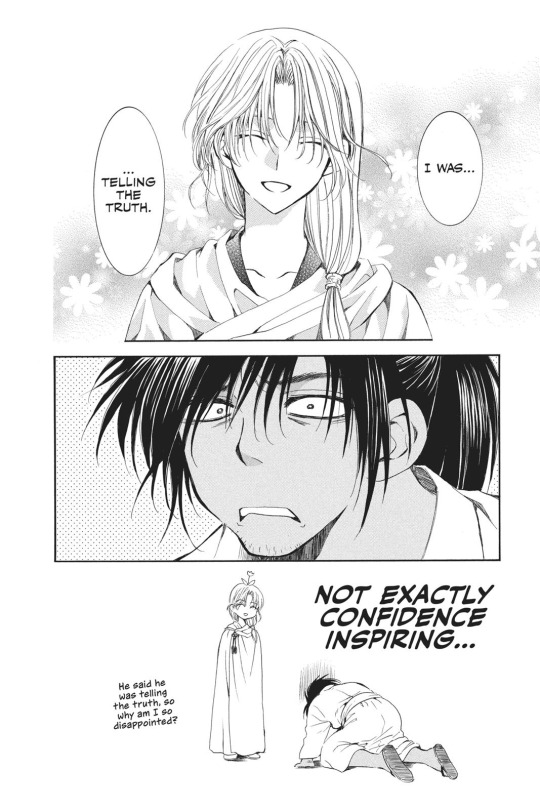
On the other hand, there is how the higher narrative tries to show us his emotional state, his point of view and feelings. It is inherently something he as a character is very against of ever since he became King. Even then, what is shown to us at several occasions is Suwon's failure in showing us what he wants to show, instead having taken from/out of him what he doesn't want to reveal. The Crimson Illness is an interesting metaphor for it I think. It can easily be interpreted as a visible manifestation of Suwon's already existing struggles, after all. The Crimson illness makes all that is hidden visible to others. It gives it physical symptoms. Again and again, his illness and bloodline are revealed to others against his will. The illness is the crack to the performance Suwon tries to maintain as a strong King. It makes him vulnerable, forcing him to depend more on others. It breaks his role and how he wants others to see him. He wants to be seen as strong and independant and in control, but he can't control his episodes and when he is shown in a frail condition. It brings out what is inside, it makes his repressed thoughts visible to us readers as well, it's the reason why the narrative shows us his inner struggles more closely.
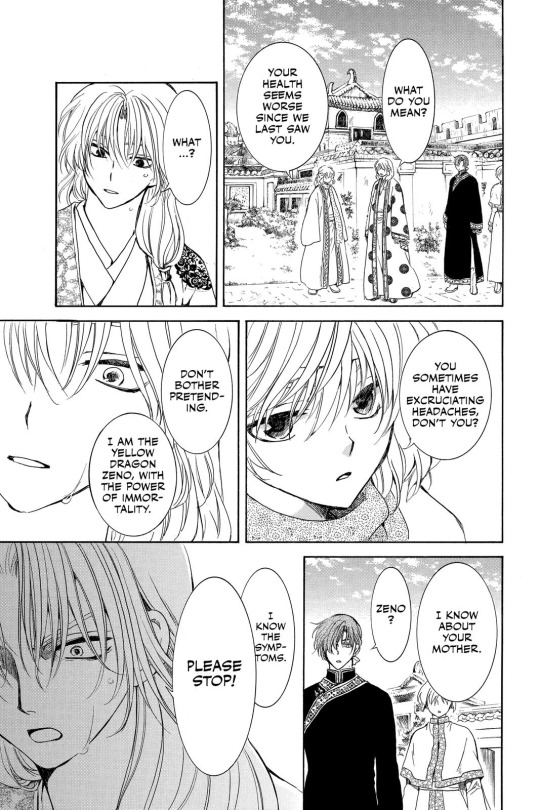
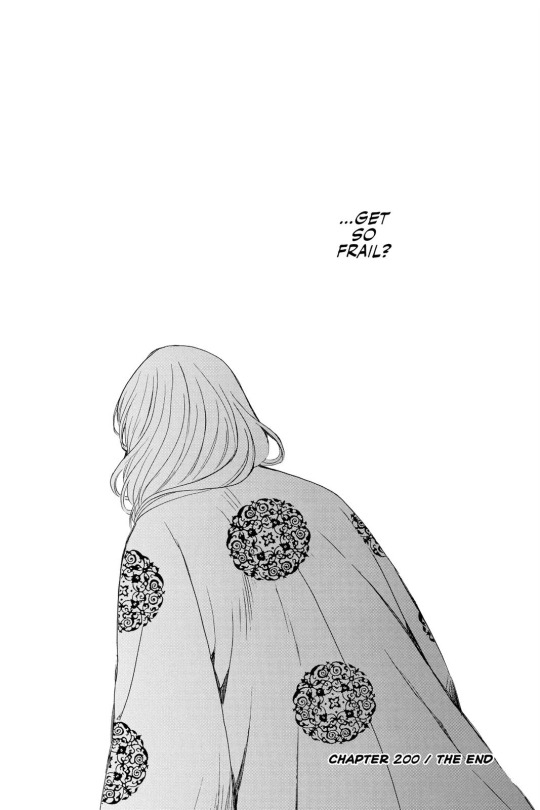
Suwon can only somewhat control and influence what is shown outside, which why I think he showed himself so little in the castle arc as an attempt to show himself only when he's in an "acceptable" state for it. In the end, he still pushes himself more than necessary when he has no other choice (and because he doesn't want to rely more on the people around him). However, after the South Kai arc Suwon knows important development. From then, Suwon has no choice but to face things for real : His is sick, heavily weakened and disabled by it, and is going to die soon. In parallel, he also acknowledges he can't discard Yona-Hak, and that he can and has to rely on them for Kouka's sake.
Chapter 243 is the very first time (Minsu aside I imagine, but we are not shown that) that Suwon himself tells someone directly about his bloodline and his illness. As said before, chapter 243 is an entire performance, but it's one where he got to choose the person he wanted to say these things to. However there is still a gap between what Suwon wants to show to Hak and what he doesn't want to show to others. The chapter is still framed not from Suwon's POV at all. Suwon has no privacy, even in a scene initially presented to be only between the two of them. The idea that at this point Suwon is allowed any privacy is unreliable framing influenced by Hak's flawed POV. Hak by then is not yet really aware of the existence and purpose of Suwon's personal bodyguards in detail. Suwon can convey messages undirectly, but because he still has to show himself a certain way to characters like the shadows he's not allowed to show things explicitely. He can only be seen through others' eyes, forced to rely neither on the images nor the text typed and shared by the narrator(s), but instead on the subtext and unintelligible scribblings. Suwon is still bound by the vow the Shadows made to themselves 10 years ago, but freed at the end by the vow bounding Hak to him. To Hak alone he can share his truth : that he can't and won't respond to his expectations, nor that he is only what he shows as King to others. No one else might understand, but he trusts Hak can get the message.
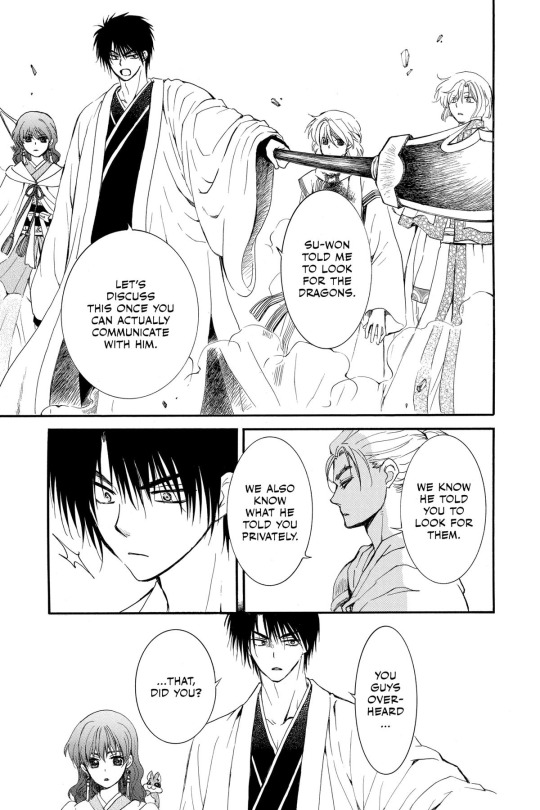
Then Suwon is attacked by Shinah, and at first we were not shown at all what Suwon was thinking and feeling. The second he wakes up in chapter 256, he leaves that behind him and thinks as a King again. However something important changed, obviously he still has people around him he has to act a certain way for, but the shadows are no more. The people left around him are more flexible and actually rejoice that Suwon decides to retreat. They don't know it was partly motivated by lingering feelings for Yona and Hak, but they're still more flexible and allows Suwon more privacy and agency.
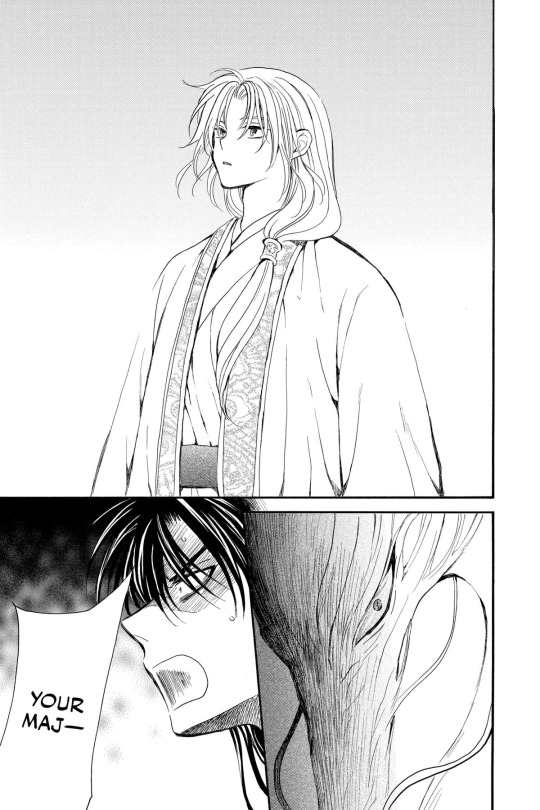
So it brings us again to chapter chapter 261/262, which are to me the very first occurence of Suwon being allowed to be a character-narrator where he gets to truly show and tells his own story. Showing instead of being shown. Showing the experience and feelings of being seen. Chapter 262 doesn't only highlight the importance of gaze in Suwon's character, but is meaningful by making Suwon himself show it to Hak, and to us readers by proxy. This is what makes Suwon and Hak's interactions in this chapter so so important. Suwon, as already established, is still resolved to perform his duties as King until the very end. That's why he still doesn't show himself bare in front of the people of Kuuto, Mundok or Lili. He still has to be a strong King that inspires confidence and reassurance to them. He can't show that he is actually chronically ill and severely wounded. What citizens expect from the King is to be strong enough to withstand, resist, and win against all the disasters they face.
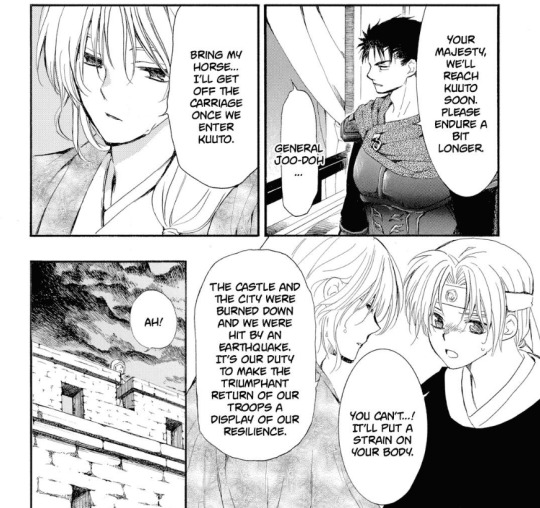

But when it's only Hak and Suwon alone next, Hak is of course annoyed. There is no one on the rooftop of the collapsing palace to watch and judge them. Suwon doesn't have to keep his armor, his King costume, and keep performing in front of him, acting like his wound doesn't hurt him this much and that he's perfectly collected. The shadows are no more, they're isolated from the city. Hak as we can see with chapter 200 or 224 is annoyed by all these roles and formalities and always go against them. This is what makes Hak free. Hak goes wherever he wants to be, will play any role needed to get there and let go of them when they get on his way. Hak says he sucks at letting go, but in a way he is much better at letting go of these things than Suwon is, even when he doesn't have to keep them.
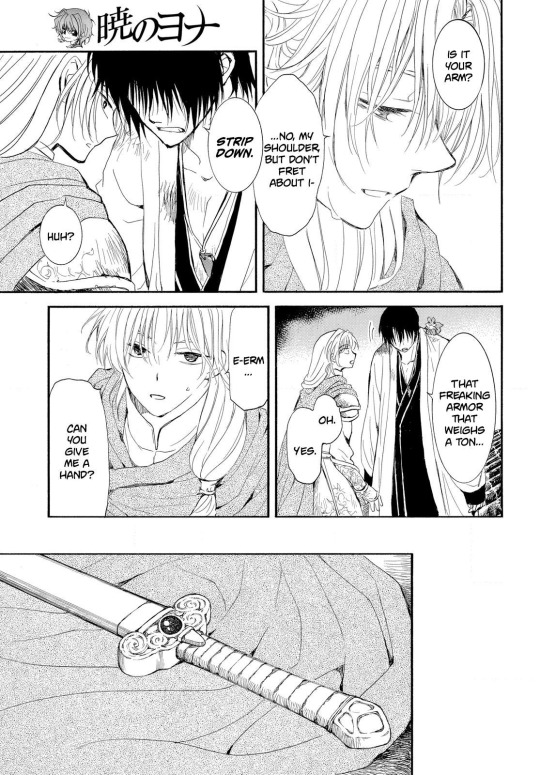
Something interesting in this scene, as already pointed out by others, is the intent behind making Hak order Suwon to undress. Despite his tone, he still doesn't undress Suwon forcibly to then show him to all of us against his will, but encourages Suwon to act upon it himself. He is frustrated by Suwon's own passivity in regard to himself. Suwon has to ask for Hak's help, but it is still triggered by Suwon's own will. Hak forces Suwon to ask for the support he needs in order to have agency. Showing himself is difficult for Suwon, both literally because of his wound and emotionally because he is not used to it, so Hak helps him for it. Of course, the act of removing his armor and letting go of his father's sword is also when Suwon at long last can stop just performing as the King character he is supposed to be. Finally, through his trust in Hak, he can truly and openly show something different to us readers too.
Then Suwon talks about himself. Not just facts and objective information like he did in chapter 243, but how he feels and what /he/ sees. Finally, Suwon tells and shows.
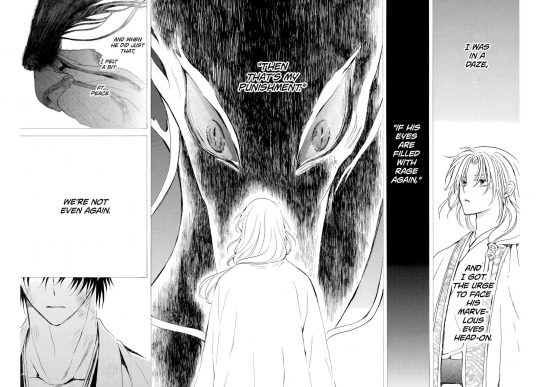
This spread is one of my favorite of all times I think, because it just encapsulates everything I'm trying to explain with this post. Suwon is undeniably a character-narrator in this scene because of how he shows willingly and literally to someone else what he saw and felt, making this moment surreal. After all, it should be impossible for Hak to see that. The text in this spread is typeset like is any inner monologue and is not in speech bubbles. Hak, by the rules of narratology in comics is not supposed to hear any of it. They are thoughts inside of Suwon. However the last panel showing the bottom part of Hak's face seems to imply that Hak very much sees and hears it all. Hak here is in our exact position as reader, able to see, read, feel what Suwon is sharing inside of him. It's not something brought to the outside taken from him for it to be broken down, scrutinized and judged by others. Instead, Suwon makes us come to him inside. It is something incredibly private and intimate Suwon shows in full spread to Hak and us alone. It is precious. Suwon's narration transcends narrative layers to reach Hak's senses and ours at the same time. It represents how Shinah in dragon form is watching him, but by doing so he is very much the one to show himself and Shin-ah. It is not a first person narration where we would see things through his eyes, but a third person one, above. As a character-narrator, Suwon is obviously not at the top of the narrative hierarchy and Kusanagi is the one making all these narrative and laying out choices, but here, she lets Suwon carry the role of teller and shower. In chapter 249, she decided against showing that to us directly like she showed how he felt in chapter 221. She willingly gave Suwon the time and space to do it himself when he was ready to, to the person of his choice alone.
As Hak says at the end of chapter 262, Suwon can choose another path instead of repeating the same complicated one. As we've seen, his role as King indeed puts him in an overcomplicated and messy position where he has to jungle between clashing expectations and duties and his own feelings, making everyone and him first hurt in the end. From then on, Suwon can try another path for real.
In that same chapter before he removes his armor, Suwon also tells Mundok that he can't possibly influence the Heavens. So here, I have a final interpretation about this:
Aren't the Heavens the representation for a higher narrative layer? They're the ones making the "final" judgment and punishing characters or not, they're the ones making (one layer of) the narrative of the story through the prophecy. They can't be touched and reached for, they're in another world above the characters. Suwon is well aware that he is only a character with a defined role in the narrative, so to him, there is only so much he can do and it's pointless to fight against it. In chapter 268, Suwon says again that there's nothing he can do since they're not people. The Gods are the ones seeing and showing everything.
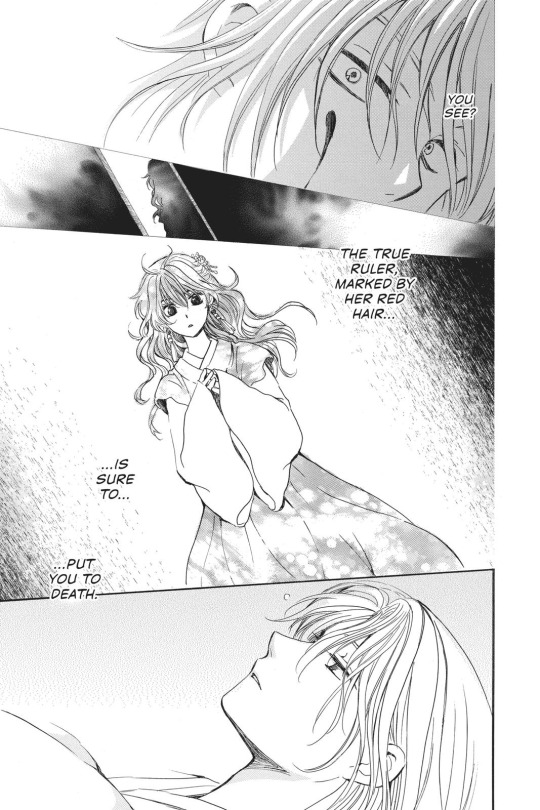
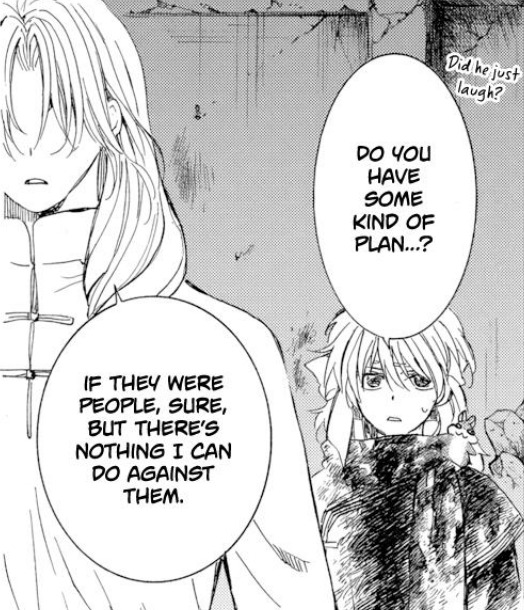
It is perfectly illustrated in chapter 268 with Yona. Yona didn't want to make it about Hak at all, she doesn't want to involve him in any of this, and doesn't openly mention and express her feelings for him inside the chalice because it is not her focus and priority then. Yet the Gods show everything against Yona's will and to her despair. They bring out and show her and us a majority of moments Yona shared with Hak, many that were supposed to be only with the two of them. But like the Shadows with Suwon, the Gods were always watching. Yona was able to make her own decision and was resolved to leave the chalice with the dragons before they brought this up in chapter 267. It is something shown about her and against her, they take from her any agency she had, she is trapped. Similarly to Suwon in chapter 221, she is forced to face feelings she underestimated the paralyzing power of.
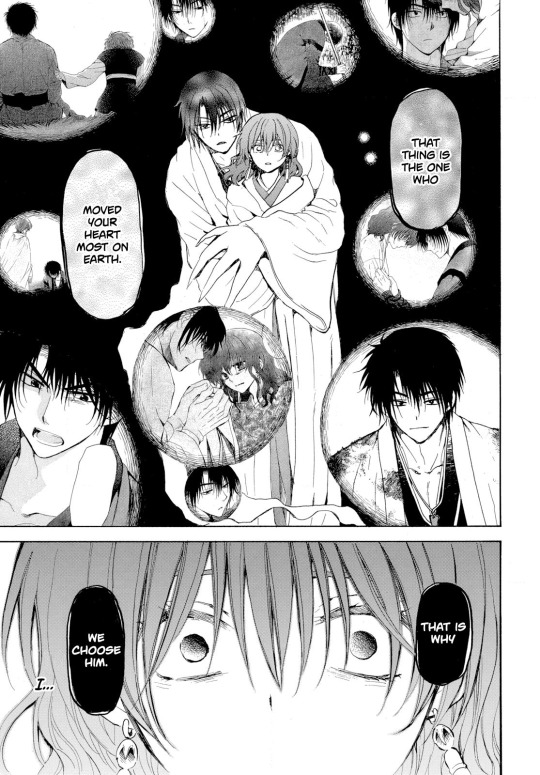
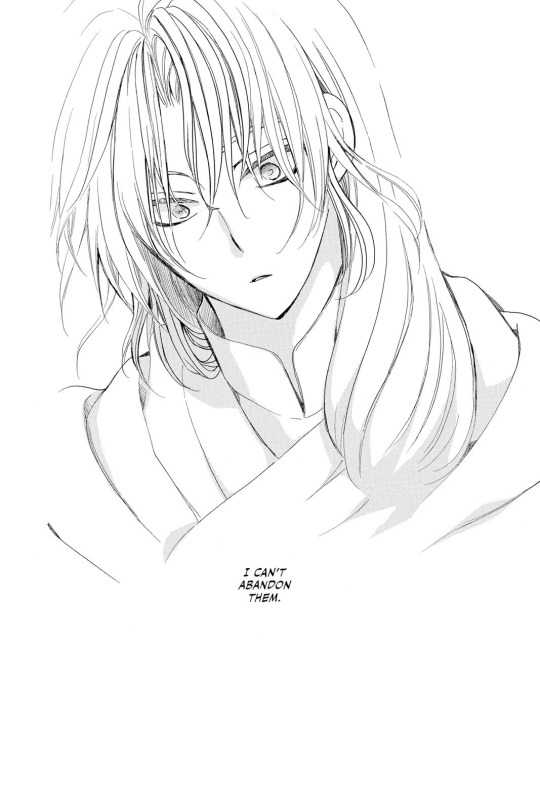
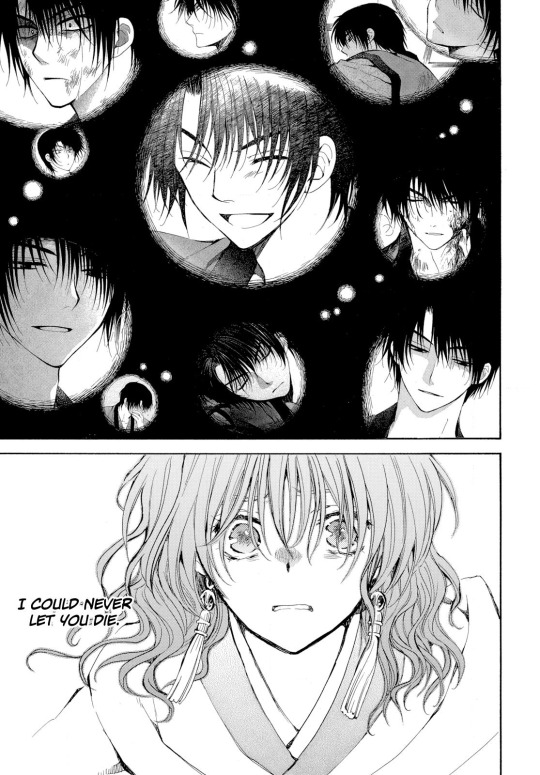
However, I'd argue that Yona still managed to bring the Gods closer to us, at least from the invisible higher layer they were on the narrator hierarchy of the story to a layer inside the narrative. Again, she brought them on the page, she made them real, she made them characters and more "human". They're still entities with the power to show, but also visible characters that can be changed and talked with: they literally can be moved and influenced. Yona and Zeno showed them to us, in the sense of making them visible and revealing them to us readers. Maybe the way they treat Yona is their reaction against it, unconsciously. After all, bringing them on the pages of the story forced them to face their contradictions, it is threatening them. Unfortunately, by chapter 268 it still didn't strip them of their powers and ability to control the other characters' narrative.
But I think Suwon perfectly understood all of this. Suwon now has the power to show his perspective. Even if the Gods aren't people, he is free to choose the way he frames how he is seen and watched with his own subjectivity. He is now a subjective character, not only an objective (in the sense of being object) one. That's why his plan depends on getting the Gods' full attention on him. This page is so similar from Shinah looking at him in chapter 262 for a reason. Suwon now gets more control and freedom in what he can show and tell. Suwon literally brought the Gods down to us and showed them. It's not like Yona climbing up to them. Suwon has the power to influence the Heavens and the narrative, because Suwon is not only his static character role, but a character that can change and who we can openly feel for. He won't submit to the Dragon Gods' narrative like he was resigned to before. He is the narrative too. Like Yona or Hak or any other character we ever followed is. Akatsuki no Yona is a story about characters and their feelings, and Suwon can now fully embrace his power in it.
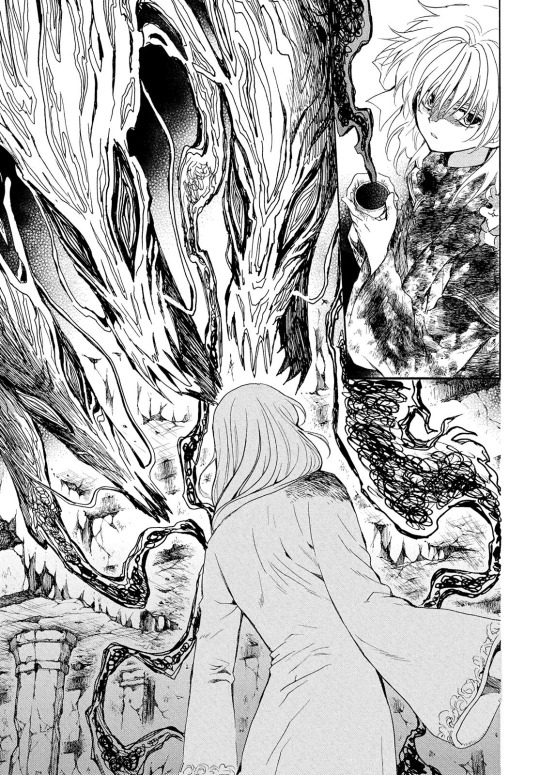
So I find the resonance between Suwon's developing agency in the narrative and the way readers engage with him really interesting. I guess Kusanagi didn't expect Suwon to be controversial the way he is to this day when she started the story and created him, but I like how she discusses it in the story and tied it so beautifully with his character arc. I said about chapter 243 that we shouldn't try to decipher Suwon's message, but actually I don't think that's true. I don't think Kusanagi is that pessimist about her readers. Sure, we see as much as the Shadows or as the Dragon Gods do but we're not them either. The characters share so much with us too, like seen in chapter 262. I think the story simply wants to encourage us to question how we engage with the characters and what we expect from them by representing caricatures of extreme fandom opinions (that can be pretty prevalent and very vocal unfortunately). Suwon himself was always a character we were encouraged to decipher, I think. Otherwise it would mean not trying to understand him at all because he played the role of an antagonist (or whatever he can be called) anyways, which is incredibly sad. I think we were always encouraged to resist against that and try to understand him despite his own resistance. Suwon needed to learn that it's okay to be vulnerable and show us, and that it won't make him less loved and cared for.
Suwon will probably always be a character that is scrutinized and judged in and outside the story, it keeps being so despite all recent developments. But today I am convinced that nor Suwon on his level as a character, nor the narrative will keep making him a character that is forever only seen by others anymore. Now we will see what Suwon sees and feels what he feels, he will show us. He will influence the Heavens and shake the narrative itself I'm sure, he will bring them all down to us.
I love you Suwon <3
#akayona#yotd#yona of the dawn#akatsuki no yona#suwon#soowon#lumen rants#i love you suwon#writing everything but my thesis im crying#i wonder if it could be said that while suwon brings others down#Yona moves the entire narrative higher and higher#like while Suwon brings specific characters to his level and strips them of their higher authority#Yona given her position as protagonist we follow the closest#brings the entire frame of what we see together with her. she goes to others#whereas Suwon brings others to him...or something#Yona doesn't really remove anyone's authority but she climbs up to their level#And within that I feel like Hak is kinda a free spirit that moves from one to the other lol...#I will keep observing and test this theory with the future chapters...we shall see...#it can be that deep#if you're interested in the topic of the narratology of comic art i recommend the book of the same name by kai mikkonen#the free pdf is easily findable#akayona thoughts#yona#princess yona#hak#honestly? the 30 pictures tumblr limit annoys me sm.#there is so much more i wanted to include here to illustrate. I hope it's not too hard to read.#yes suhak is that major and meaningful in the narrative and their love is groundbreaking too
64 notes
·
View notes
Text
i miss blaseball every day
#riv#right now im writing the final essay in this class on exploring how fandom interacts with blaseball and with generative narrative#im also thinking of interviewing people on the topic if possible#if anyone is interested#blaseball#metraposting#im just getting so sad reading old articles from when it was still active
118 notes
·
View notes